[38] Imamah (Leadership) - Sayyedah Fatimah al-Ma’soumeh - Part 2: The Theology of Her Ziyarah
A series of discussions on the teachings of Imam Sadiq (sixth Imam of the Muslims), from the book Misbah ash-Sharia (The Lantern of the Path)
In His Name, the Most High
This is part thirty-eight of our ongoing series of discussions on the book attributed to Imam al-Sadiq entitled Misbah ash-Sharia (The Lantern of the Path).
In our previous session, we introduced a new, vibrant thread to our discussion, and as we began to weave it into our study, we found ourselves guided by the echoes of our past discussions. The foundational principle of our study remains unchanged: each session builds upon the last, weaving together into a larger, interconnected tapestry.
Having journeyed with Sayyedah Fatimah al-Ma’soumeh from the House of the Imamate in Madinah to her final, sacred resting place in Qom, we now seek to engage with her on a deeper level.
Our focus shifts from the history of her life to the theology of her legacy, and the key to that legacy has been preserved for us in her beautiful and profound visitation prayer, her Ziyarah.
Today, in the second of our two sessions dedicated to this noble lady, we will unpack this text.
We will see that her Ziyarah is not a mere ritual, but a school of divine knowledge and a covenant of active loyalty, designed to train the believer in the principles of Wilayah.
In His most beautiful Name, and with full trust in His support, we continue our reflection…
The previous parts can be found here:
Video of the Majlis (Sermon/Lecture)
This is the video presentation of this write-up as a Majlis (part of the Truth Promoters Weekly Wednesday Majlis Program)
Audio of the Majlis (Sermon/Lecture)
This is the audio presentation of this write-up as a Majlis (part of the Truth Promoters Weekly Wednesday Majlis Program)
Recap
The Journey That Founded a City
In our last session, we had the honour of reflecting on the life, legacy, and spiritual station of the Noble Lady of the Ahl al-Bayt, Sayyedah Fatimah al-Ma’soumeh (peace be upon her). Our discussion unfolded across three main points:
Her Journey of Loyalty: We began by exploring her identity, forged in the House of Wilayah as the daughter and sister of Imams. We established that her courageous journey from Madinah was not a simple family visit but a sacred Hijrah—a political and spiritual act of loyalty to the Imam of her time. Her journey, which ended in sacrifice at the hands of Abbasid agents, was a public sermon in motion, a powerful echo of Karbala and a timeless lesson in active defiance against tyranny.
Qom as a Divine Trust: We then examined the profound consequences of her martyrdom. Her burial in Qom was not a historical accident but the fulfilment of stunning prophecies from the Imams. Her presence transformed the city into a sanctuary (haram) for the Ahl al-Bayt, a fortress of knowledge, and the future base for the Islamic Revolution. We understood her shrine not as a tomb, but as a living Baqiyyat Allah—a remnant of God—that became the seed for a civilisation of scholarship and resistance.
Her Spiritual Status: Finally, we reflected on her personal spiritual rank as Karīmat Ahl al-Bayt. We learned that the reward for her visitation is conditional upon ma‘rifah—knowing her right—which is to recognise her as a perfect mirror of the Imamate. We situated her within the golden chain of female guardianship alongside Sayyedah Fatimah al-Zahra and Sayyedah Zaynab, and understood her shrine as a conduit for divine effusion (fuyudhat), making her a timeless archetype for the steadfast women of the resistance today.
Having established the reality of her life and station, our session today seeks to engage with her legacy through the beautiful text of her visitation prayer, her Ziyarah, understanding it as a school of divine knowledge and a covenant of active loyalty.
Imamah (Leadership) – Sayyedah Fatimah al-Ma’soumeh: The Theology of Her Ziyarah
Greeting and Recognition: Knowing Her Right
Our exploration into the school of Sayyedah Ma’soumeh’s Ziyarah begins where the visitation itself begins: with a salutation.
The act of greeting in Islam is never a mere formality; it is a prayer, a declaration of allegiance, and a sacred contract. The specific words with which we are taught to greet the Noble Lady are, therefore, the first lesson in the theology of her station, a lesson that echoes through the great Ziyarat and Duas of our faith.
The Opening of Ziyarah: Peace as a Sacred Covenant
To understand the weight of the Ziyarah’s opening word, “al-Salam,” we must first understand its origin. As-Salam is one of the Divine Names of God Himself, signifying The One who is the ultimate source of all peace, security, and wholeness.
The Qur’an introduces this name in a powerful sequence:
هُوَ اللَّهُ الَّذِي لَا إِلَٰهَ إِلَّا هُوَ الْمَلِكُ الْقُدُّوسُ السَّلَامُ الْمُؤْمِنُ الْمُهَيْمِنُ الْعَزِيزُ الْجَبَّارُ الْمُتَكَبِّرُ ۚ سُبْحَانَ اللَّهِ عَمَّا يُشْرِكُونَ
“He is God—there is no deity except Him. He is the Sovereign (al-Malik), the Most Holy (al-Quddus), the Source of Peace (al-Salam), the Granter of Security (al-Mu’min), the Overseer (al-Muhaymin), the Almighty (al-Aziz), the Compeller (al-Jabbar), the Supreme (al-Mutakabbir). Exalted is God above all that they associate as partners with Him.”
— Qur’an, Surah al-Hashr (The Chapter of the Exile) #59, Verse 23
Therefore, when a believer says “As-Salamu alaykum” to another, they are invoking this Divine Name. The greeting is a profound prayer and a declaration that carries three layers of meaning:
A Prayer: “May God, who is As-Salam, grant you security and well-being.”
A Declaration: “You are in the sanctuary of God’s name, a name I now invoke.”
A Pledge: “You are safe from me. My hand, my tongue, my wealth, and my honour will do you no harm.”
This pledge is the foundation of the Islamic social contract.
It is a guarantee of security.
The Prophet Muhammad (peace and blessings be upon him and his family) made this explicit, linking the very identity of a Muslim to this state of peaceful conduct:
المسلم من سلم المسلمون من لسانه ويده
“The Muslim is the one from whose tongue and hand other Muslims are safe (salima).”
— Al-Kulayni, Al-Kafi, Volume 2, Kitab al-Iman wa al-Kufr (The Book of Faith and Disbelief), Chapter on the Muslim, Page 233, Hadeeth 1
To offer “Salam” and then proceed to harm another—whether through backbiting, business fraud, or any form of abuse—is therefore a monstrous hypocrisy.
It is to violate a covenant made in the name of God.
The great scholar of ethics, Shahid Ayatollah Dastghaib Shirazi, explained that this greeting is a practical pillar of a believer’s character:
افشاءِ سلام کردن، یعنی آشکارا سلام کردن، از علائم ایمان است. معنی آن این است که من نه تنها به تو ضرری نمی رسانم، بلکه منشاء خیر و امان برای تو هستم. این یک تعهد عملی به برادری است.
“Spreading the greeting of Salam is one of the signs of a believer, and it means: ‘Not only will I not harm you, but I am a source of goodness and safety for you.’ It is a practical commitment to brotherhood.”
— Shahid Ayatollah Abdul Husayn Dastghaib Shirazi, Qalb-e Saleem (The Sound Heart), Volume 1, Chapter on the Signs of a Believer, Page 145
This leads to a critical jurisprudential point.
If a believer’s Salam is a guarantee of safety, one cannot in good conscience offer it to an active, unrepentant oppressor.
This is why the Imams, when greeted by tyrants, would often reply with a truncated greeting to fulfil the obligation of response without granting the honour and security of the full “Salam.”
This is an act of Tabarra (disassociation), a refusal to grant the oppressor the divine security they themselves violate.
Thus, when the Ziyarah opens with this sacred greeting, it is our pledge of safety and loyalty to the camp of the Ahl al-Bayt.
اَلسَّلاَمُ عَلَيْكِ يَا فَاطِمَةَ الْمَعْصُومَةُ بِنْتَ مُوسَى بْنِ جَعْفَرٍ
“Peace be upon you, O Fatimah al-Ma‘soumah, daughter of Musa ibn Ja‘far.”
— Shaykh Abbas al-Qummi, Mafatih al-Jinan, Section on the Ziyarah of Lady Fatimah Ma‘soumah
Our Salam to her is a pledge of allegiance.
We affirm her station through her name, al-Ma‘soumah—a station of purity bestowed by God. And we affirm our loyalty to the entire chain of divine authority by naming her lineage: “daughter of Musa ibn Ja’far,” an act that echoes the emphasis on lineage in Ziyarat Jamia al-Kabira.
Ma‘rifah: Knowing Her Right
This recognition is the very key to the visitation. The promise of Paradise for visiting her is not unconditional. Her brother, Imam al-Ridha, attached a profound condition to this reward:
مَن زارَها عارِفًا بِحَقِّها فَلَهُ الجَنَّةُ
“Whoever visits her, knowing her right, Paradise shall be for him.”
— Shaykh al-Saduq, Thawab al-A’mal wa ‘Iqab al-A’mal, Section on the Rewards of Ziyarah, Page 98, Hadeeth 1
The entire value of the Ziyarah pivots on this one word: ma’rifah.
This is not simple knowledge; it is a deep, heart-based recognition of her true status.
As the great gnostic and jurist, Ayatullah Bahjat (may God rest his pure soul), explained:
زیارت امامزادگان انسان را به امام نزدیک می کند. معرفت آنها مقدمه و راهی برای معرفت امام است.
“Indeed, visiting the children of the Imams is a gate to visiting the Imams themselves, and knowing them (ma’rifatuhum) is a path to knowing the Imam.”
— Ayatullah Muhammad Taqi Bahjat, Dar Mahzar-e Bahjat (In the Presence of Bahjat), Volume 2, Section on Ziyarah and Tawassul, Page 148 (2005 Qom Edition).
“Her right” is the right of her purity, her sacrifice, and above all, her absolute submission to the Imam.
To know her right is to recognise that she is a perfect mirror reflecting the light of the Imamate.
The Qur’anic Paradigm: Recognition of Signs
This emphasis on recognition is a core Quranic principle, linking true faith to the recognition of divine signs. The opening verses of Surah al-Baqarah define the righteous as those who possess this quality of recognition for the unseen and the revealed:
الَّذِينَ يُؤْمِنُونَ بِالْغَيْبِ... وَالَّذِينَ يُؤْمِنُونَ بِمَا أُنزِلَ إِلَيْكَ
“Those who have faith in the unseen... and those who have faith in what has been sent down to you...”
— Qur’an, Surah al-Baqarah (The Chapter of the Cow) #2, Verses 3-4
The Imams and their chosen kin are the living link between the unseen and the revealed.
True Ziyarah is an act of faith, an exercise in recognising God’s living signs.
This concept of recognition as the key to a relationship with God echoes powerfully in Dua Abu Hamza al-Thumali, where Imam Zayn al-Abedeen teaches us to say:
بِكَ عَرَفْتُكَ وَأَنْتَ دَلَلْتَنِي عَلَيْكَ
“It is through You that I have known You, and it was You who led me to Yourself.”
— Imam Zayn al-Abedeen, Dua Abu Hamza al-Thumali, Mafatih al-Jinan
One of the ways God leads us to Himself is by placing His chosen saints on our path.
To visit Sayyidah Ma’soumeh with ma’rifah is to recognise her as a guide sent by God to lead us back to Him.
Scholarly Reflection: Recognition as Clarification
The great martyr and philosopher, Ayatullah Sayyid Muhammad Baqir al-Sadr, explained the profound difference between mere information and true ma‘rifah:
المعرفة ليست مجرد علم، بل هي إدراك رسالي يربط القلب بالحق، ويجعل الإنسان شاهداً للولاية.
“Recognition (ma‘rifah) is not mere knowledge (‘ilm), but a mission-oriented awareness (idrak risali) that binds the heart to the truth and makes a person a witness of Wilayah.”
— Ayatullah Sayyid Muhammad Baqir al-Sadr, Durus fi ‘Ilm al-Usul, Volume 1, Section on The Proofs, Page 56
This is precisely the kind of recognition the Ziyarah demands.
It is an awareness that makes one a “witness of Wilayah,” affirming her role in the chain of Imamate and committing to the truth she represents.
Contemporary Resonance: Recognition in Our Age
This training in recognition is an urgent necessity for our time.
To recognise the true saints of God equips us with the insight (basirah) to recognise the true guardians of faith today.
As Imam Khamenei has stated:
شناخت ولیّ خدا و ایستادن پای او، معیار اصلی هدایت و ضلالت در هر زمان است.
“Recognising the Wali (Guardian) of God and standing by him is the principal criterion of guidance and misguidance in every age.”
— Imam Khamenei, from a speech delivered in Mashhad, March 21, 2010 (1 Farvardin 1389).
This brings us to a crucial dimension of Wilayah: it is comprised of two inseparable wings—Tawalla (loving loyalty to the camp of God) and Tabarra (principled disassociation from the camp of falsehood).
This dual principle is the methodology of Prophet Ibrahim, as praised in the Qur’an:
قَدْ كَانَتْ لَكُمْ أُسْوَةٌ حَسَنَةٌ فِي إِبْرَاهِيمَ وَالَّذِينَ مَعَهُ إِذْ قَالُوا لِقَوْمِهِمْ إِنَّا بُرَآءُ مِنكُمْ وَمِمَّا تَعْبُدُونَ مِن دُونِ اللَّهِ
“There has already been for you an excellent example in Abraham and those with him, when they said to their people, ‘Indeed, we are disassociated from you and from whatever you worship other than God.’”
— Qur’an, Surah al-Mumtahanah (The Chapter of She Who is Examined) #60, Verse 4
To love the Ahl al-Bayt, therefore, requires us to declare our disassociation from their enemies.
As Ayatollah Misbah Yazdi explained:
تولى و تبرى دو ركن اساسى ايمان هستند. نمىتوان ادعا كرد كه خدا را دوست داريم، اما با دشمنان او نيز دوستى كنيم.
“Tawalla and Tabarra are two fundamental pillars of faith. It is not possible to claim that we love God, yet also maintain friendship with His enemies.”
— Ayatollah Muhammad Taqi Misbah Yazdi, Akhlaq dar Qur’an (Ethics in the Qur’an), Volume 1, Section on the Pillars of Faith.
Our ma’rifah of Sayyidah Ma’soumeh must lead us to adopt her clear stance of Tawalla towards the Imam and Tabarra from the tyrant who opposed him.
This dual stance of loving loyalty and principled disassociation is not merely a recommendation for the pious; it is a non-negotiable duty (taklif) that forms the very spine of a believer’s identity. The Qur’an establishes a clear and exclusive vision of allegiance, stating that the community of believers are allies only to one another, forming a single, cohesive body united under God’s guardianship.
وَالْمُؤْمِنُونَ وَالْمُؤْمِنَاتُ بَعْضُهُمْ أَوْلِيَاءُ بَعْضٍ
“The believing men and believing women are allies (awliyā’) of one another.”
— Qur’an, Surah al-Tawbah (The Chapter of Repentance) #9, Verse 71
This bond of Wilayah is so central that the Imams have defined the very essence of faith through it.
This is powerfully illustrated in a foundational tradition where a trusted companion, Fudayl ibn Yasar, came to Imam al-Baqir (peace be upon him) with a concern.
He explained that some people were reducing religion to mere verbal testimony, a superficial declaration devoid of true allegiance.
The Imam refuted this hollow understanding, explaining that faith is an active, loving alignment of the heart.
He then asked Fudayl a question that cuts to the very core of our religion:
هَلِ الدِّينُ إِلَّا الْحُبُّ؟
“Is religion anything but love?”
— Al-Kulayni, Al-Kafi, Volume 2, Kitab al-Iman wa al-Kufr (The Book of Faith and Disbelief), Chapter 165: Bab al-Hubb fi Allah wa al-Bughd fi Allah (Chapter on Love in God and Hate in God), Page 125, Hadeeth 5
The Imam then immediately proved his point by citing the Qur’an itself, showing that this love is not a passive emotion but a dynamic force that demands action and allegiance. The first verse he recited established the ultimate test of sincere love:
قُلْ إِن كُنتُمْ تُحِبُّونَ اللَّهَ فَاتَّبِعُونِي يُحْبِبْكُمُ اللَّهُ وَيَغْفِرْ لَكُمْ ذُنُوبَكُمْ ۗ وَاللَّهُ غَفُورٌ رَّحِيمٌ
“Say, [O Muhammad], ‘If you should love God, then follow me, [so] God will love you and forgive you your sins.’ And God is Forgiving and Merciful.”
— Qur’an, Surah Aal-e-Imran (The Chapter of the Family of Imran) #3, Verse 31
This verse establishes the critical link: true love for God is validated only through obedience to His chosen guide.
This principle—that true faith is defined by where one places one’s loving loyalty and where one declares one’s disassociation—was a cornerstone of Imam Khomeini’s teachings.
He stated it unequivocally:
از واجبات اولیه ماست که با ستمکاران سر سازش نداشته باشیم. این یک تکلیف الهی است.
“It is among our primary duties that we do not compromise with oppressors. This is a divine obligation”
— Imam Khomeini, Sahifeh-ye Imam, Volume 15, Speech on October 2, 1981 (10 Mehr 1360), Page 285
Therefore, any action that gives support, legitimacy, or succour to an oppressor is not a minor sin or a political miscalculation.
It is a direct and severe violation of this foundational Quranic principle, a betrayal of the definition of faith given by our Imams, and an abandonment of a primary divine duty.
It is, in short, entirely contrary to the teachings of Islam.
Call to Clarify: Recognition as Resistance
First, we must clarify that Ziyarah is not superstition. It is an act of recognition—ma‘rifah—of the sacred line of the Imamate, a declaration of where we stand in the great battle between truth and falsehood.
Second, true recognition demands allegiance. It requires us to live by the covenant of Ziyarat Ashura: “I am at peace with those who are at peace with you, at war with those who are at war with you, a friend to those who are friends with you, and an enemy to those who are enemies to you”. Our greeting of “peace” to her must translate into a principled stance of resistance and disassociation against the oppressors she resisted.
Third, in our time, recognition means naming clearly who carries the line of Wilayah and who cloaks tyranny in the robes of false piety.
Without ma’rifah, even the salutation of “peace” can become a veil for hypocrisy. But with ma’rifah, the Ziyarah becomes a declaration of allegiance, an act of clarification, and a prayer for the ultimate steadfastness. It is to ask God for what we are taught to seek in Dua Alqamah:
اَللّهُمَّ... ثَبِّتْ لي قَدَمَ صِدْقٍ عِنْدَكَ مَعَ الْحُسَيْنِ وَاَصْحابِ الْحُسَيْنِ الَّذينَ بَذَلُوا مُهَجَهُمْ دُونَ الْحُسَيْنِ عَلَيْهِ السَّلامُ
“O God... make firm for me a footing of truth (qadama sidqin) with You, alongside al-Husayn and the companions of al-Husayn—those who sacrificed their own souls for the sake of al-Husayn, peace be upon him.”
— Shaykh Abbas al-Qummi, Mafatih al-Jinan, Section on Duas Recited After Ziyarat AshuraIt is this prayer for an unshakeable footing of truth that turns our recognition into a weapon of truth.
Intercession and Wilayah: The Bridge of Mercy
Having recognised the station of Sayyedah Ma’soumeh through our greeting, the Ziyarah now guides us from recognition to petition.
We do not only stand as witnesses to her greatness; we are taught to engage with it, to ask from it, and to seek it as a means of salvation.
This section of the Ziyarah contains one of the most direct and powerful requests for intercession found in any visitation text, opening a profound discussion on the nature of Divine Mercy.
The Ziyarah’s Petition and Its Theological Weight
In a moment of intimate supplication, the visitor turns to the Noble Lady and makes a direct appeal:
يَا فَاطِمَةُ اشْفَعِي لِي فِي الْجَنَّةِ فَإِنَّ لَكِ عِنْدَ اللَّهِ شَأْناً مِنَ الشَّأْنِ
“O Fatimah, intercede for me in Paradise, for indeed you have before God a lofty station among stations.”
— Shaykh Abbas al-Qummi, Mafatih al-Jinan, Section on the Ziyarah of Lady Fatimah Ma’soumeh
The structure of this request is the key.
We ask based on the reality of her “lofty station”—a station granted by God.
This is the essence of Tawassul, or seeking a means of approach.
We are approaching God through the honourable gateways He has appointed.
This methodology is the very foundation of Dua Tawassul, where we affirm this principle for each of the Ma’sumin:
يَا وَجِيهاً عِنْدَ اللَّهِ اشْفَعْ لَنَا عِنْدَ اللَّهِ
“O you who are distinguished in the sight of God, intercede for us in the sight of God!”
— Shaykh Abbas al-Qummi, Mafatih al-Jinan, The Supplication of Tawassul
The Ziyarah of Sayyedah Ma’soumeh explicitly grants her a similar role, confirming her immense spiritual rank as a gateway to divine mercy.
The Unbreakable Qur’anic Foundation
This concept of intercession (shafa’ah) is a Quranic reality.
The Qur’an negates unauthorised intercession but explicitly confirms authorised intercession.
The Throne Verse is the clearest proof:
مَنْ ذَا الَّذِي يَشْفَعُ عِنْدَهُ إِلَّا بِإِذْنِهِ
“Who is it that can intercede with Him except by His permission?”
— Qur’an, Surah al-Baqarah (The Chapter of the Cow) #2, Verse 255
This divine permission is the central pillar.
Intercession is not an independent power but a manifestation of God’s own system of mercy.
The late Grand Ayatollah al-Khu’i clarified this with jurisprudential precision in his commentary on the Qur’an:
إن الشفاعة نوع من الدعاء، وهو طلب أحد شيئاً من غيره، ولا شك في أن الدعاء جائز... فالشفاعة طلب للمغفرة من الله سبحانه، وليست عملاً مستقلاً في مقابل سلطانه.
“Indeed, intercession is a type of supplication (dua), which is the seeking of something by one person from another, and there is no doubt that supplication is permissible... Therefore, intercession is the seeking of forgiveness from God, the Glorified, and it is not an independent act in opposition to His authority.”
— Grand Ayatollah Sayyid Abu al-Qasim al-Khu’i, Al-Bayan fi Tafsir al-Qur’an, Section on the Meaning of Intercession, Page 467
The Hadith: Intercession in Practice
The traditions of the Ahl al-Bayt further clarify that this divine system of mercy is vast, extending even to the righteous among their followers.
Imam Ja’far al-Sadiq (peace be upon him) said:
إِنَّ الْمُؤْمِنَ لَيَشْفَعُ لِحَمِيمِهِ، إِلَّا أَنْ يَكُونَ نَاصِبِيّاً
“Indeed, the believer will intercede for his close friend, unless he is a Nasibi (one who displays enmity to the Ahl al-Bayt).”
— Al-Kulayni, Al-Kafi, Volume 8, Kitab al-Rawdah, Page 101, Hadeeth 71
If this is the station of a believer, what then is the station of the Karimah of the Ahl al-Bayt?
The answer is given in a beautiful tradition where a companion, Sa’d ibn Sa’d, directly asked Imam al-Ridha (peace be upon him) about the reward for visiting his sister, Sayyidah Ma’soumeh. The Imam replied with the famous guarantee:
عَنْ سَعْدِ بْنِ سَعْدٍ قَالَ: سَأَلْتُ أَبَا الْحَسَنِ الرِّضَا (ع) عَنْ فَاطِمَةَ بِنْتِ مُوسَى بْنِ جَعْفَرٍ (ع)، فَقَالَ: مَنْ زَارَهَا فَلَهُ الْجَنَّةُ. وَفِي رِوَايَةٍ أُخْرَى: مَنْ زَارَهَا عَارِفاً بِحَقِّهَا فَلَهُ الْجَنَّةُ.
Sa’d ibn Sa’d said: I asked Abu al-Hasan al-Ridha (peace be upon him) about Fatimah, the daughter of Musa ibn Ja’far (peace be upon them). He replied: “Whoever visits her, for him is Paradise.” And in another narration [of the same event]: “Whoever visits her, knowing her right, for him is Paradise.”
— Shaykh al-Saduq, Uyun Akhbar al-Ridha, Volume 2, Chapter 67, Page 267, Hadeeth 5
This full narration is the practical blueprint for intercession.
The promise of Paradise is absolute, but the second narration clarifies the condition for unlocking that promise: ma’rifah.
The visitation with recognition aligns the believer with the system of Divine Mercy, making one eligible to receive the intercession that her lofty station allows.
The Mystical Reality: Wilayah as the Link
To understand intercession on its deepest level is to understand Wilayah. The great exegete, Allamah Sayyed Muhammad Husayn Tabatabai, provides a profound definition of intercession in his masterpiece, Tafsir al-Mizan.
He moves beyond the purely legalistic to explain its mystical reality, defining it not as a transaction, but as a connection:
الشَّفَاعَةُ حَقِيقَتُهَا رَبْطُ الْمَخْلُوقِ بِوَاسِطَةٍ مُقَرَّبَةٍ إِلَى اللهِ، تَسْتَجْلِبُ الرَّحْمَةَ وَتَدْفَعُ الْعَذَابَ.
“The reality of intercession is the linking of the creature to a means (wasitah) that is near to God, which draws mercy and deflects punishment.”
— Allamah Muhammad Husayn Tabatabai, Tafsir al-Mizan, Volume 1, Commentary on Surah al-Baqarah Verse 48, Page 158
This definition is critical.
Intercession is not about bypassing God; it is about connecting to Him through a wasitah—an intermediary or a living link that He Himself has appointed.
The Wali of God is this very wasitah.
Imam Khomeini, in his mystical works, builds upon this reality, explaining that the Ahl al-Bayt are not merely links, but are the perfect manifestations of God’s own attributes.
To turn to them is to turn to God through the most beautiful channels He has created. He writes:
اهل بیت عصمت، وسائط فیض حق هستند، و به وسیله آنها و حب به آنها است که عبادت به کمال می رسد و طاعت کامل می گردد.
“The People of the House of Infallibility are the intermediaries of the effusion of the Truth (God), and it is through them and through love for them that worship reaches perfection and obedience is completed.”
— Imam Ruhollah Khomeini, Adab al-Salah (The Disciplines of Prayer), Section on the Conditions of the Heart in Worship, Page 142
Sayyidah Ma’soumeh, as Karimat Ahl al-Bayt, is a manifestation of God’s attribute of Karam (Generosity).
Seeking her intercession is to seek God’s generosity through the pure vessel He has appointed for it.
The Worldly Echo: Intercession as Solidarity
This metaphysical reality of intercession has a direct and urgent echo in our socio-political lives.
The structure of shafa‘ah is that a powerful and honourable advocate stands beside a needy supplicant to amplify their voice before the ultimate authority.
Before God, every single one of us is a needy supplicant, utterly dependent on His mercy.
Yet, within our universal need, God has established a divine test: He places those whose worldly needs are more desperate and acute directly in our path. The oppressed, the deprived, and the dispossessed are not a burden; they are a trial and a gateway to God’s pleasure.
Our response to their need becomes the measure of our own sincerity.
As the Commander of the Faithful, Imam Ali ibn Abi Talib (peace be upon him), explained:
إِنَّ اللهَ سُبْحَانَهُ فَرَضَ فِي أَمْوَالِ الْأَغْنِيَاءِ أَقْوَاتَ الْفُقَرَاءِ، فَمَا جَاعَ فَقِيرٌ إِلَّا بِمَا مُتِّعَ بِهِ غَنِيٌّ، وَاللهُ تَعَالَى سَائِلُهُمْ عَنْ ذلِكَ.
“Indeed, God, the Glorified, has ordained in the wealth of the rich the sustenance for the poor. A poor person does not go hungry except by that which a rich person has been given to enjoy, and God Almighty will question them about that.”
— Al-Sharif al-Radhi, Nahj al-Balagha, Volume 4, Section on Aphorisms and Short Sayings (Hikam), Saying #328, Page 79
Our duty of Wilayah, therefore, is to become worldly intercessors for those whose rights have been stolen.
This is not a “cold slogan,” as the leader of the Yemeni resistance, Sayyed Abdul Malik al-Houthi, articulated in his Eid al-Ghadir speech of 1443 AH (2022 CE):
وَلَايَتُنَا لَيْسَتْ شِعَاراً بَارِداً، بَلْ هِيَ مَسْؤُولِيَّةُ النُّصْرَةِ وَالْمُوَاسَاةِ وَالِاحْتِمَالِ مَعَ الْمَظْلُومِينَ.
“Our Wilayah is not a cold slogan, but a responsibility of support (nusrah), consolation (muwasah), and bearing alongside the oppressed.”
— Sayyed Abdul Malik al-Houthi, Televised Speech on the Occasion of Eid al-Ghadir, Sana’a, 18 Dhul Hijjah 1443 AH (July 18, 2022 CE).
This definition of Wilayah as an active, supportive responsibility was the very foundation of the movement of Imam Musa as-Sadr. He saw serving the deprived not as mere charity, but as the highest form of worship and a civilisational imperative.
He famously declared:
خدمة الإنسان عبادة، وخدمة المظلومين هي من أرقى أشكال العبادة. إنها الطريق الذي يوصلنا إلى الله.
“Serving human beings is a form of worship, and serving the oppressed is one of the most sublime forms of worship. It is the path that connects us to God.”
— Imam Musa as-Sadr, from his collected speeches in the volume “Ab’ad,” in a speech on social justice, Beirut, circa 1974.
In our own time, we see this principle embodied in the legendary steadfastness of the oppressed themselves, who teach the rest of the world the meaning of faith.
The martyred Secretary General of Hizbullah, Sayyed Hassan Nasrallah, has often reflected on this reality, particularly in the context of Gaza:
هؤلاء المظلومون في غزة، بصبرهم وثباتهم الأسطوري، هم الذين يقدمون الحجة على العالم كله اليوم. هم ليسوا فقط بحاجة إلى نصرتنا، بل نحن بحاجة إلى مدرستهم في الإيمان والكرامة.
“These oppressed people in Gaza, with their patience and legendary steadfastness, are the ones who are presenting the proof (hujjah) to the entire world today. It is not just that they are in need of our support; rather, we are in need of their school of faith and dignity.”
— Sayyed Hassan Nasrallah, from a televised speech addressing the ongoing conflict in Gaza, late 2023.
Her intercession for us in the hereafter becomes a paradigm for our intercession for the downtrodden in this life.
Just as we ask her to stand for us before God, we must stand for the people of Gaza, Yemen, Palestine and indeed all the oppressed, before the world, recognising that in serving them, we are serving God, and in learning from their steadfastness, we are drawing closer to Him.
Call to Clarify: True vs. False Intercessors
First, we must clarify that true, salvific intercession flows only through the channels God has appointed: the Ahl al-Bayt and those who, like Sayyedah Ma’soumeh, have been granted a “lofty station.”
Second, we must clarify that the tyrants and worldly powers who pose as “protectors” are false intercessors. They offer worldly “protection” in exchange for submission to their will, delivering only oppression. In the face of this, our duty is clear, as affirmed by the office of Grand Ayatollah Sistani:
إن الدفاع عن المظلومين والمحرومين واجب ديني وإنساني.
“Indeed, the defence of the oppressed and the deprived is a religious and a human duty.”
— Grand Ayatollah Sayyid Ali al-Sistani, from the Official Statement issued by his office following the historic meeting with His Holiness Pope Francis, Najaf al-Ashraf, Iraq, March 6, 2021 (22 Rajab 1442 AH)
Finally, the Ziyarah trains us in a profound spiritual discipline. Just as we turn to Qom and seek Sayyedah Ma’soumeh’s intercession to draw down divine mercy, so too must we turn to the oppressed of our time and stand in solidarity with them, for that is one of the greatest practical means of drawing divine mercy upon ourselves and our communities.
The Covenant of Qom: Ziyarah as Loyalty in Action
Having recognised the station of Sayyedah Ma’soumeh and sought her intercession, the Ziyarah now guides us to its ultimate purpose: the sealing of a covenant.
A visitation in the school of Ahl al-Bayt is not a passive experience; it is a conscious act of renewing one’s pledge of allegiance.
The conclusion of her Ziyarah is a masterclass in what this pledge entails, transforming the prayer from a personal petition into a lifelong commitment to a divine cause.
Ziyarah’s Conclusion: A Covenant to Live and Die By
The Ziyarah closes not with a request for worldly needs, but with the most profound supplication a believer can make—a prayer for total alignment with the path of the Ahl al-Bayt:
اللَّهُمَّ إِنِّي أَسْأَلُكَ أَنْ تَخْتِمَ لِي بِالسَّعَادَةِ، وَأَنْ تَجْعَلَ مَحْيَايَ مَحْيَا مُحَمَّدٍ وَآلِ مُحَمَّدٍ، وَمَمَاتِي مَمَاتَ مُحَمَّدٍ وَآلِ مُحَمَّدٍ.
“O God, I ask You to seal my end with happiness, and to make my life the life of Muhammad and the family of Muhammad, and my death the death of Muhammad and the family of Muhammad.”
— Shaykh Abbas al-Qummi, Mafatih al-Jinan, Section on the Ziyarah of Lady Fatimah Ma‘soumeh
This is the very essence of the covenant.
To ask to “live their life” is to ask for a life of submission to God, of unwavering justice, of patience in trial, and of resistance to tyranny.
To ask to “die their death” is to ask for a death of honour, of martyrdom, and of complete devotion to the truth.
This prayer transforms the Ziyarah from a visit into a pledge of allegiance. It is the exact same covenant we make in Ziyarat Ashura when we plead with God:
اَللّهُمَّ اجْعَلْ مَحْياىَ مَحْيا مُحَمَّدٍ وَآلِ مُحَمَّدٍ وَمَماتى مَماتَ مُحَمَّدٍ وَآلِ مُحَمَّدٍ
“O God, make my life the life of Muhammad and the family of Muhammad, and my death the death of Muhammad and the family of Muhammad.”
— Shaykh Abbas al-Qummi, Mafatih al-Jinan, The Ziyarah of Ashura
By placing this same pledge at the end of Sayyidah Ma’soumeh’s Ziyarah, we are taught that the covenant sealed in the blood of Karbala is the same covenant we renew at the shrine in Qom. As the great philosopher and exegete, Ayatullah Jawadi-Amoli, explains, this prayer is not for superficial imitation but for essential conformity:
این دعا که «حیات ما را حیات آنان و ممات ما را ممات آنان قرار بده» صرفاً یک تشابه ظاهری نیست، بلکه درخواست تخلق به اخلاق الهی آنان است. یعنی اصولی که بر زندگی و مرگ آنان حاکم بود، بر زندگی و مرگ ما نیز حاکم باشد.
“This prayer, that ‘make our life their life and our death their death,’ is not merely a request for external resemblance, but rather a petition to be imbued with their divine ethics. It means that the principles which governed their life and death should govern our life and death as well.”
— Ayatullah Abdullah Jawadi-Amoli, Adab-e Fana-ye Moqarraban (Commentary on Ziyarat Jamia al-Kabira), Volume 7, Section on Emulating the Life and Death of the Imams, Page 215
The Prophetic Vision: A Covenant Fulfilled
Her shrine did not become the site for renewing this covenant by accident. It was divinely ordained. While we have already mentioned the prophecies about Qom, there is one tradition from Imam al-Sadiq that is breathtaking in its specificity, sealing the city’s destiny with her name:
إِنَّ لَنا حَرَماً وَهُوَ بَلْدَةُ قُمَّ، وَسَتُدْفَنُ فيهَا امْرَأَةٌ مِنْ أَوْلادِي تُسَمّى فاطِمَةُ، فَمَنْ زارَها وَجَبَتْ لَهُ الْجَنَّةُ.
“Indeed, we have a sanctuary, and it is the city of Qom. And soon a woman from my descendants will be buried there, named Fatimah. So whoever visits her, Paradise is guaranteed for him.”
— Al-Majlisi, Bihar al-Anwar, Volume 57, Kitab al-Tarikh (The Book of History), Chapter 36 on the Merits of Qom, Page 216, Hadeeth 41
This prophetic vision reveals that her presence in Qom was a divinely orchestrated event to establish a centre of guardianship (Wilayah) for the latter times.
Her shrine was destined to become a place where the covenant of loyalty would be preserved and transmitted.
Contemporary Continuity: Qom as a Base for the Ummah
The covenant sealed by her shrine is not a passive, historical artifact. It is an active, revolutionary force that came to its full fruition in our own era.
Imam Khomeini, the man who rose from Qom as foretold, described the city’s ongoing responsibility in these terms:
قم، مركز فقاهت، و مركز نهضت اسلامى است، و تا قيام مهدى موعود (عج)، بايد پرچمدار بيدارى و مقاومت باشد.
“Qom is the centre of jurisprudence and the centre of the Islamic movement, and until the rising of the promised Mahdi (may God hasten his return), it must remain the standard-bearer of awakening and resistance.”
— Imam Khomeini, Sahifeh-ye Imam, Volume 14, Speech in Qom, 1980, Page 52
Qom became the nerve centre for a global movement of resistance, fulfilling the covenant of her shrine. This spirit was carried across the world by the students of that school.
The martyred leader of Pakistan, Shaheed Sayyed Arif Husayn al-Husayni, explained this global mission:
اسلامی انقلاب کسی ایک ملک یا قوم کا نہیں، بلکہ یہ دنیا بھر کے تمام مستضعفین کا انقلاب ہے۔ اور ہم پر واجب ہے کہ اس پیغام کو آگے بڑھائیں۔
“The Islamic Revolution does not belong to any one country or nation; rather, it is the revolution of all the oppressed of the world. And it is our duty to carry this message forward.”
— Shaheed Sayyed Arif Husayn al-Husayni, from a speech on the unity of the Ummah, circa 1987.
Ziyarah as Active Loyalty
To recite her Ziyarah is to renew our allegiance to this global cause. But the true measure of Ziyarah is action.
It is meant to transform the visitor from a mere supplicant into an active agent for the cause of God.
This is the spirit of the prayer of Imam Zayn al-Abedeen in the Sahifa Sajjadiyyah:
اللَّهُمَّ اجْعَلْنَا مِنْ دُعَاتِ طَاعَتِكَ، وَقَادَةٍ إِلَى سَبِيلِكَ.
“O God, make us among those who call (du’at) to Your obedience, and leaders (qadah) who guide others to Your path.”
— Imam Zayn al-Abedeen, Sahifa Sajjadiyyah, Supplication #20 (On Noble Traits of Character)
Ziyarah is the school that trains us for this role.
It is meant to move us from a static state of personal worship to a dynamic state of social responsibility.
As the late Ayatullah Sayyed Muhammad Hussein Fadhlullah taught, a ritual that does not produce a commitment to justice is a hollow one:
إن الزيارة التي لا تطلق في النفس ثورة على الظلم والباطل، هي مجرد طقس سكوني. الزيارة الحقيقية هي محطة يتزود منها الإنسان الوعي والالتزام بخط أهل البيت.
“Indeed, a Ziyarah that does not ignite in the soul a revolution against injustice and falsehood is merely a static ritual. The true Ziyarah is a station from which a person rearms themselves with awareness and commitment to the path of the Ahl al-Bayt.”
— Ayatullah al-Udhma Sayyid Muhammad Hussein Fadhlullah, Fiqh al-Hayat (The Jurisprudence of Life), Volume 2, Section on Islamic Rituals and their Social Impact, Page 112.
Call to Clarify: Ziyarah in Action
First, we must clarify that Ziyarah is not religious tourism; it is a profound testimony. It obligates us to live the life and die the death of the Ahl al-Bayt, which means embracing their cause of justice and resistance.
Second, just as Qom became a base of resistance because of her shrine, every community must strive to become a “mini-Qom”—a centre of authentic knowledge, unwavering loyalty, and a principled stance against oppression.
Finally, and most importantly, our Ziyarah to her must extend to a “Ziyarah of the oppressed.” We must visit the downtrodden with our support, our voices, and our resources. To stand with the people of Gaza, to defend the cause of Palestine, and to support the resistance is the ultimate practical expression of the covenant we seal when we stand before Sayyidah Ma’soumeh and pray, “Make my life the life of Muhammad and the family of Muhammad.” It is to make our own lives a living witness to Wilayah.
Conclusion
The Embodiment of Wilayah, The School of Ziyarah
So concludes our journey with the Noble Lady, the Karimah of the Ahl al-Bayt.
Across these two sessions, we have walked in her luminous shadow, moving from the sacred history of her sacrifice to the profound theology of her Ziyarah.
In doing so, we have discovered that her life and her visitation are not two separate topics, but two sides of a single, brilliant reality: Wilayah made manifest.
In her life, we witnessed loyalty transformed into a sermon in motion.
We saw a sacred Hijrah undertaken not for land or status, but for proximity to the Imam.
We saw a sacrifice that mirrored the trials of Karbala, and a martyrdom that fulfilled divine prophecy, transforming the geography of a humble town into the sacred sanctuary of Qom—a fortress of knowledge, a base for revolution, and a living Baqiyyat Allah, a Remnant of God on earth.
Her life was the proof that a woman, armed with ma’rifah and devotion, can become a guardian of the entire line of Imamate.
Then, in her Ziyarah, we discovered that this legacy is not a relic to be observed from a distance, but an unbreakable covenant to be made.
We learned that the greeting of “Salam” is a sacred pledge of security and allegiance.
We understood that Paradise is conditioned upon knowing her right, a recognition that must blossom into the twin duties of Tawalla—loving loyalty to the camp of God—and Tabarra—principled disassociation from the camp of falsehood.
We learned that to seek her intercession is to connect to a divine bridge of mercy, a model that commands us to become intercessors for the oppressed in our own time. And we sealed our visit with the ultimate pledge: to live the life and die the death of Muhammad and his family.
Her life, then, is the sermon; her Ziyarah is the pledge of allegiance to that sermon.
Together, they form a complete school that teaches one ultimate lesson: loyalty to God and His chosen guides is not a static belief held in the heart. It is a dynamic, demanding, and transformative journey that requires movement, recognition, solidarity, and a readiness to align our entire existence with the cause of truth.
And this covenant of loyalty—sealed in the school of Qom—is not an abstract ideal. It demands allegiance to the next link in the sacred chain of Imamate.
Therefore, our journey now takes us from the shrine of the sister to the story of the son.
In our next session, God willing, we will turn our hearts to the ninth light of the Ahl al-Bayt, the son of Imam al-Ridha, Imam Muhammad ibn Ali al-Jawad (peace be upon him). His is a life about which far too little is said, yet it is one of the most profound chapters in the epic of the Imams.
He assumed the mantle of Imamate at a tender age, a profound test for a community that had just witnessed the martyrdom of his revered father.
It was a divine examination of their faith: was their loyalty to the divine light of the Imamate itself, or to the outward appearance of a man?
We will witness his stunning displays of divine knowledge that silenced the most learned scholars of the age. We will trace his confrontation with the despots of his time, who sought to contain him just as they had his father. And we will seek to garner from his luminous, though tragically short, life the lessons of steadfastness, divine wisdom, and principled resistance that are so urgently needed in our own.
A Supplication-Eulogy for Sayyedah Fatimah al-Ma’soumeh
The School of Ziyarah and the Awaited Dawn
In the Name of God, the All-Merciful, the All-Compassionate.
O God, send Your boundless blessings upon Muhammad, the Seal of Prophets;
upon Ali, the Commander of the Faithful;
upon Fatimah, the Lady of Light;
upon Hasan, the Mirror of Patience;
upon Husayn, the Artery of Justice;
and upon the Imams from his progeny,
the lanterns of Your guidance and the guardians of Your mercy.And send peace upon Sayyedah Fatimah al-Ma‘soumeh,
the Karimah of the Ahl al-Bayt,
whose shrine in Qom became a sanctuary of Your remembrance,
and whose Ziyarah became a school for our hearts.O Lord, as we stand in her presence through visitation,
we ask You to accept our pledge.
Make our lives the life of Muhammad and the family of Muhammad,
and our deaths the death of Muhammad and the family of Muhammad,
as her covenant teaches us to pray.O Lord, we echo the voice of Ziyarat Ashura:
“I am at peace with those at peace with you,
and at war with those at war with you.”
Therefore, just as she is an intercessor before You,
make us intercessors for the oppressed in this world:
voices that speak when tyrants command silence,
hands that feed the hungry in Your name,
shields that stand when bombs fall on Gaza,
and hearts that never abandon Quds.O Lord,
hasten the return of Your Wali,
the son of Fatimah,
our master al-Mahdi (may our souls be his ransom).Make our ma’rifah of Your saints a path to our ma’rifah of him,
and count us among his loyal companions—
firm in trial,
truthful in speech,
unshaken in loyalty.O Lord,
protect our Wali al-Faqih,
preserve the righteous maraji’,
and strengthen the believers who clarify Your truth in every land.O Lord,
grant relief to the oppressed—to the children under rubble,
to the mothers in grief,
to the prisoners in chains,
to the refugees in exile.Make our ziyarah of Sayyedah Ma’soumeh a covenant to never abandon them.
O Lord,
let our answer to the call of Ziyarat Aal-e-Yaseen—
“Peace be upon you, O Remnant of God on His earth”—
be a life lived in preparation,
so that we may earn the honour of praying behind him,
with Jesus the Spirit of God by his side,
in a world where shrines are not threatened but celebrated,
where Qom’s covenant has spread to every city,
and where every believer lives as a witness of Wilayah.Amen, O Lord Sustainer of the Universes
Amen, O Most merciful of the merciful
And from Him alone is all ability and He has authority over all things.


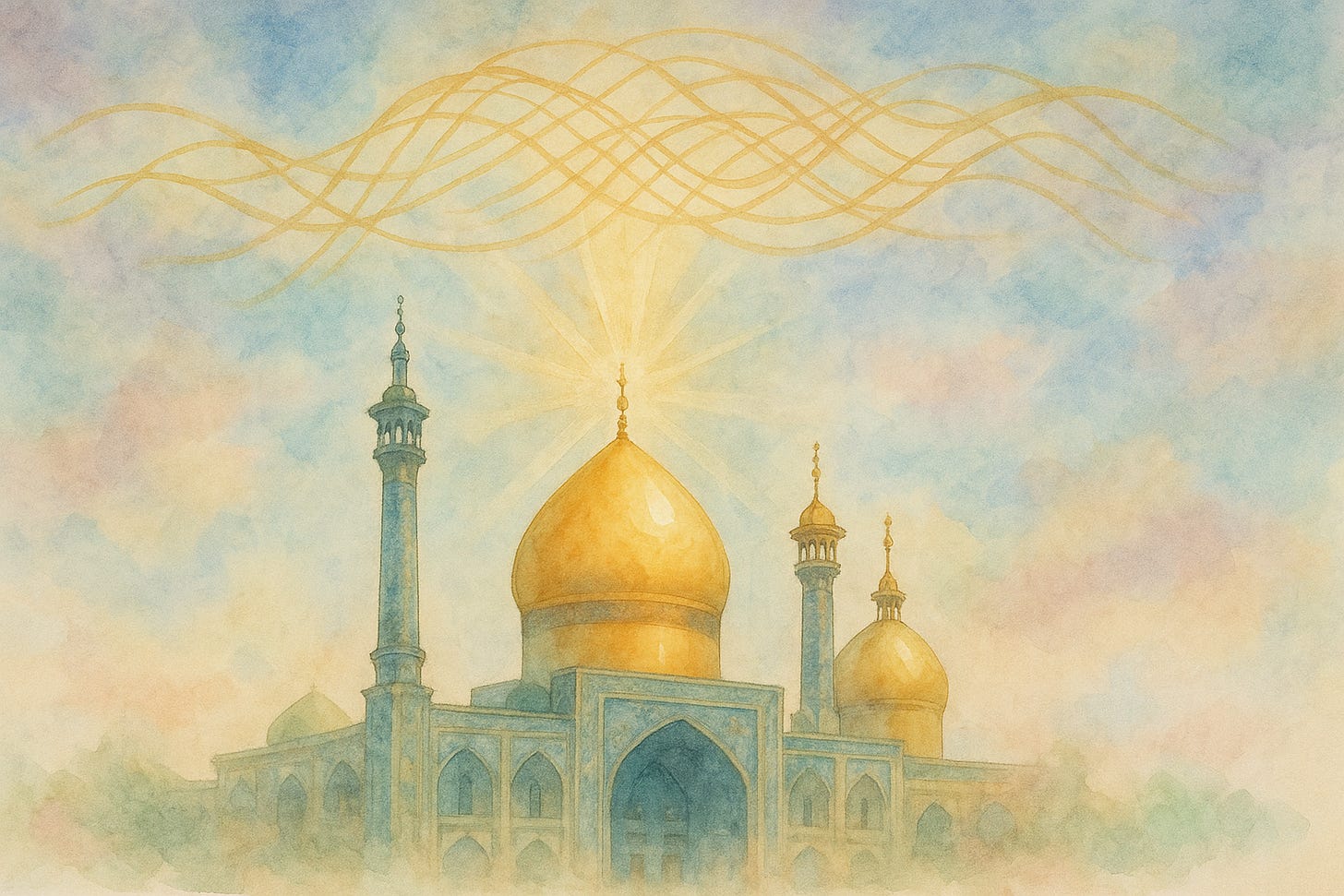

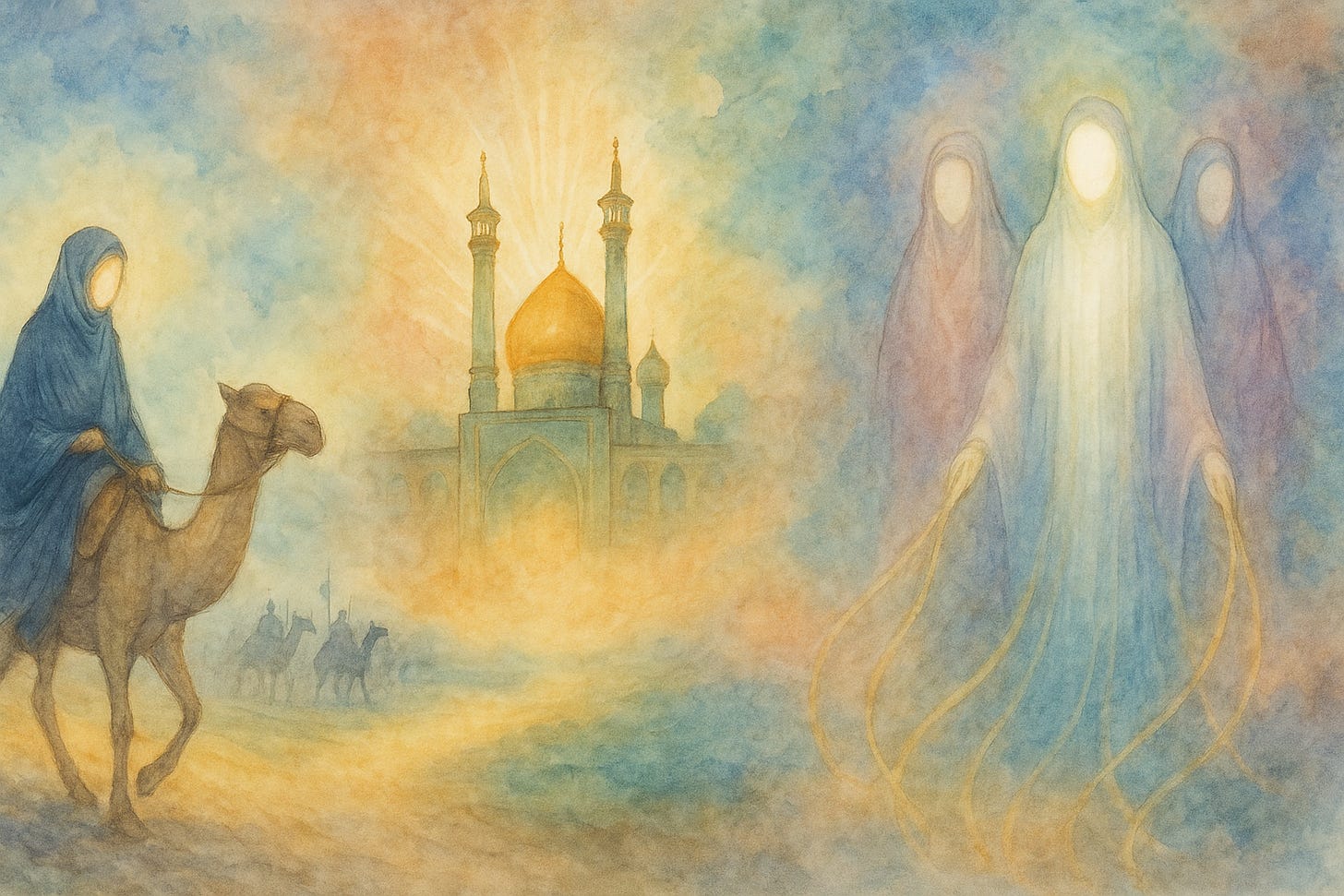
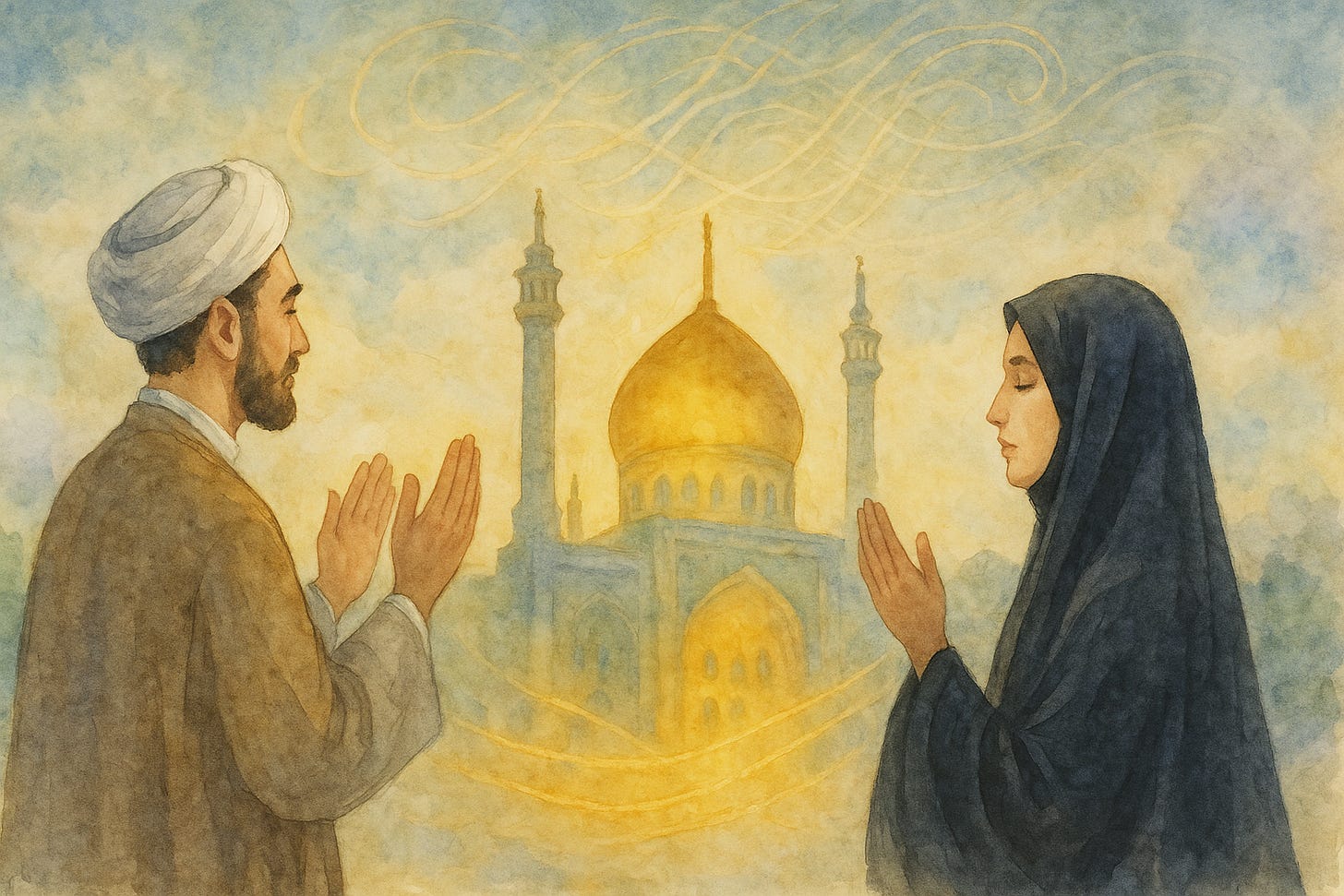
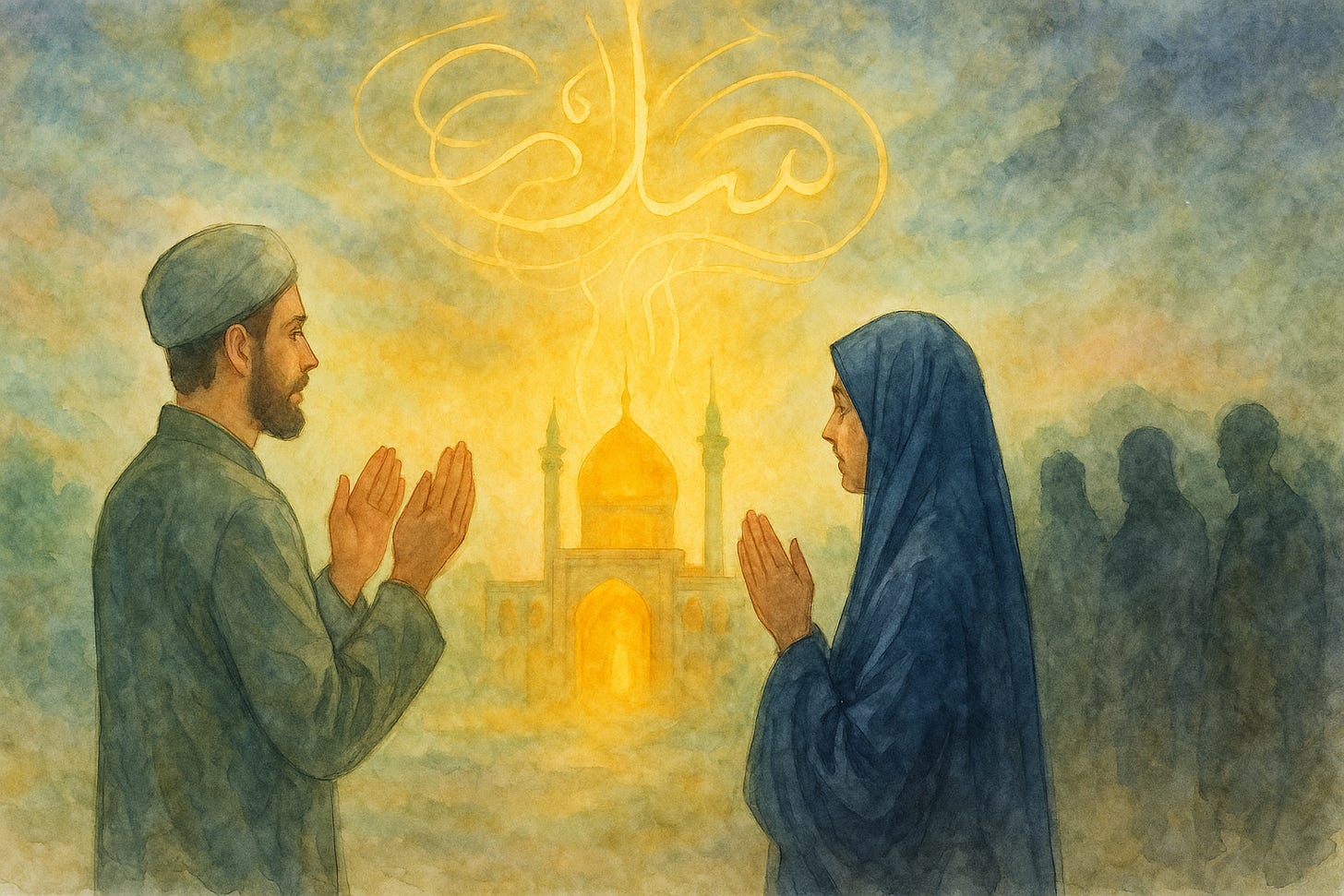
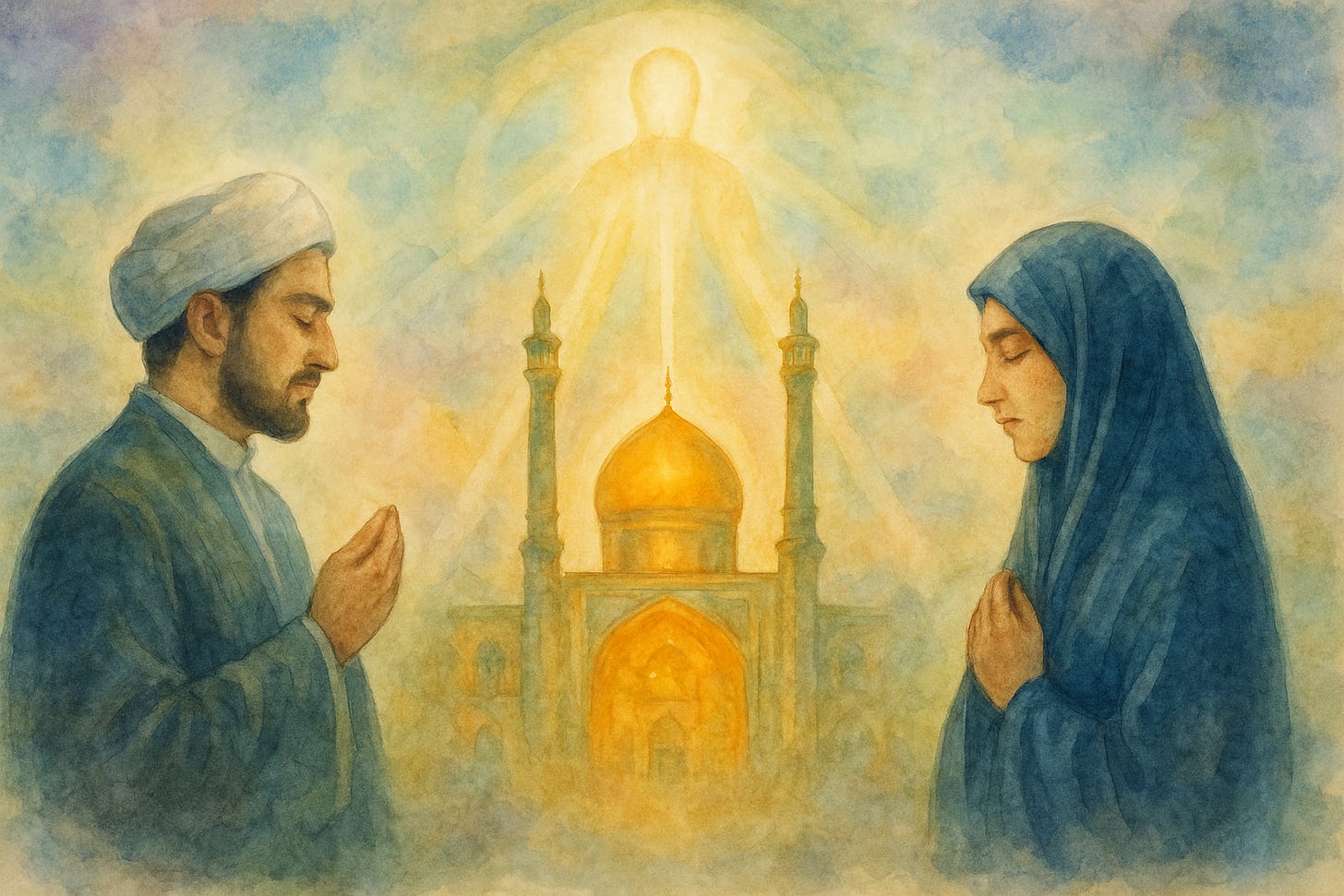
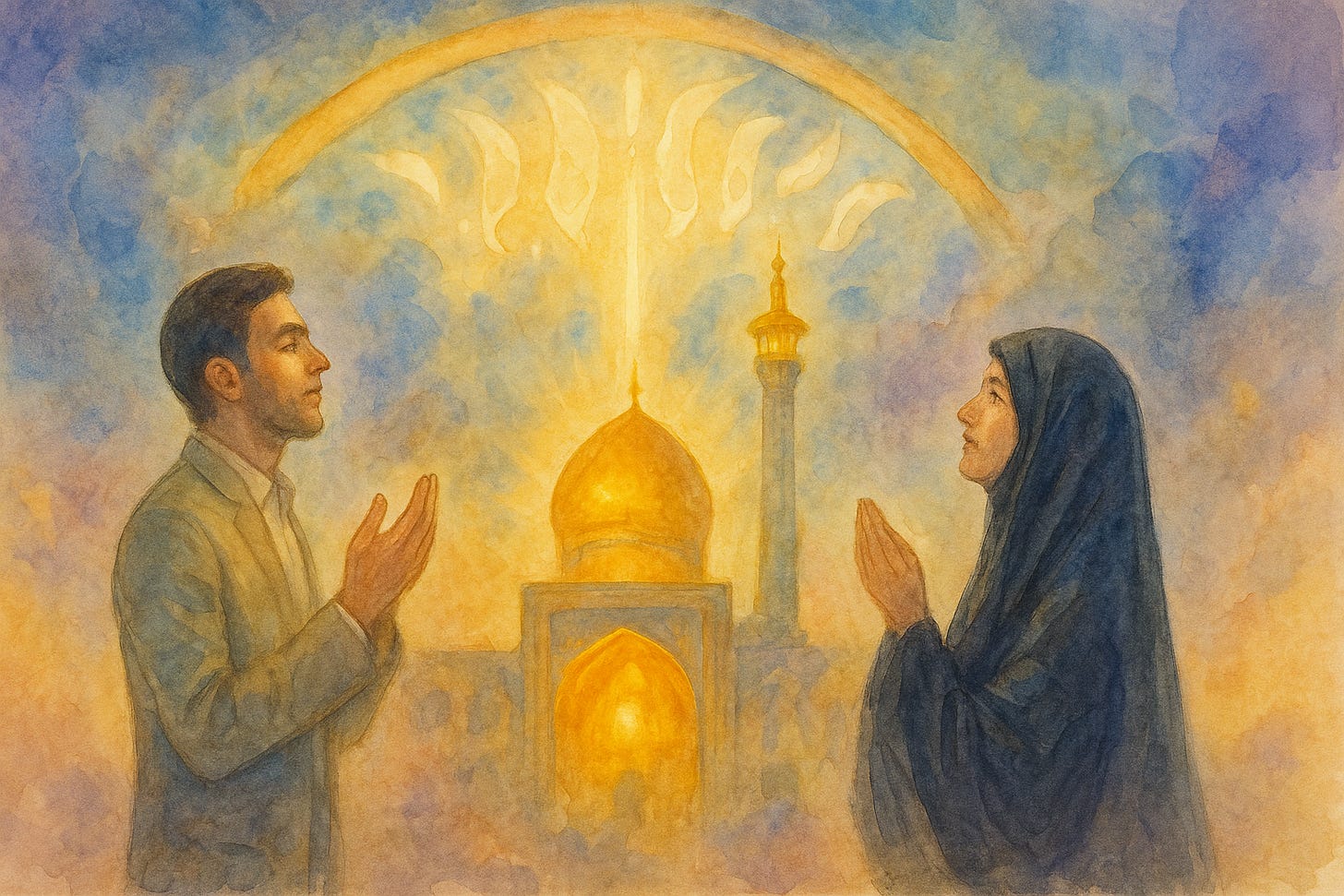
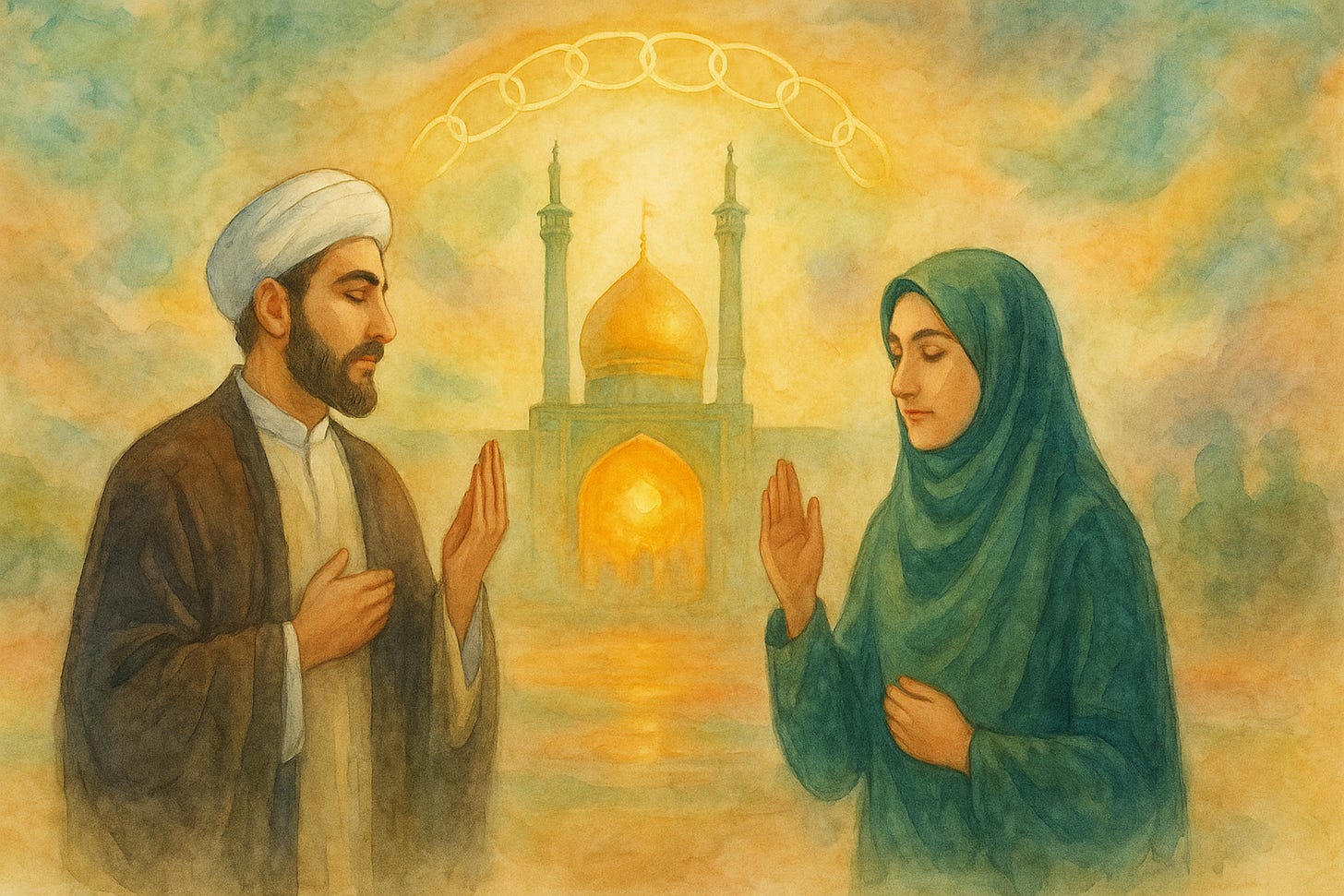
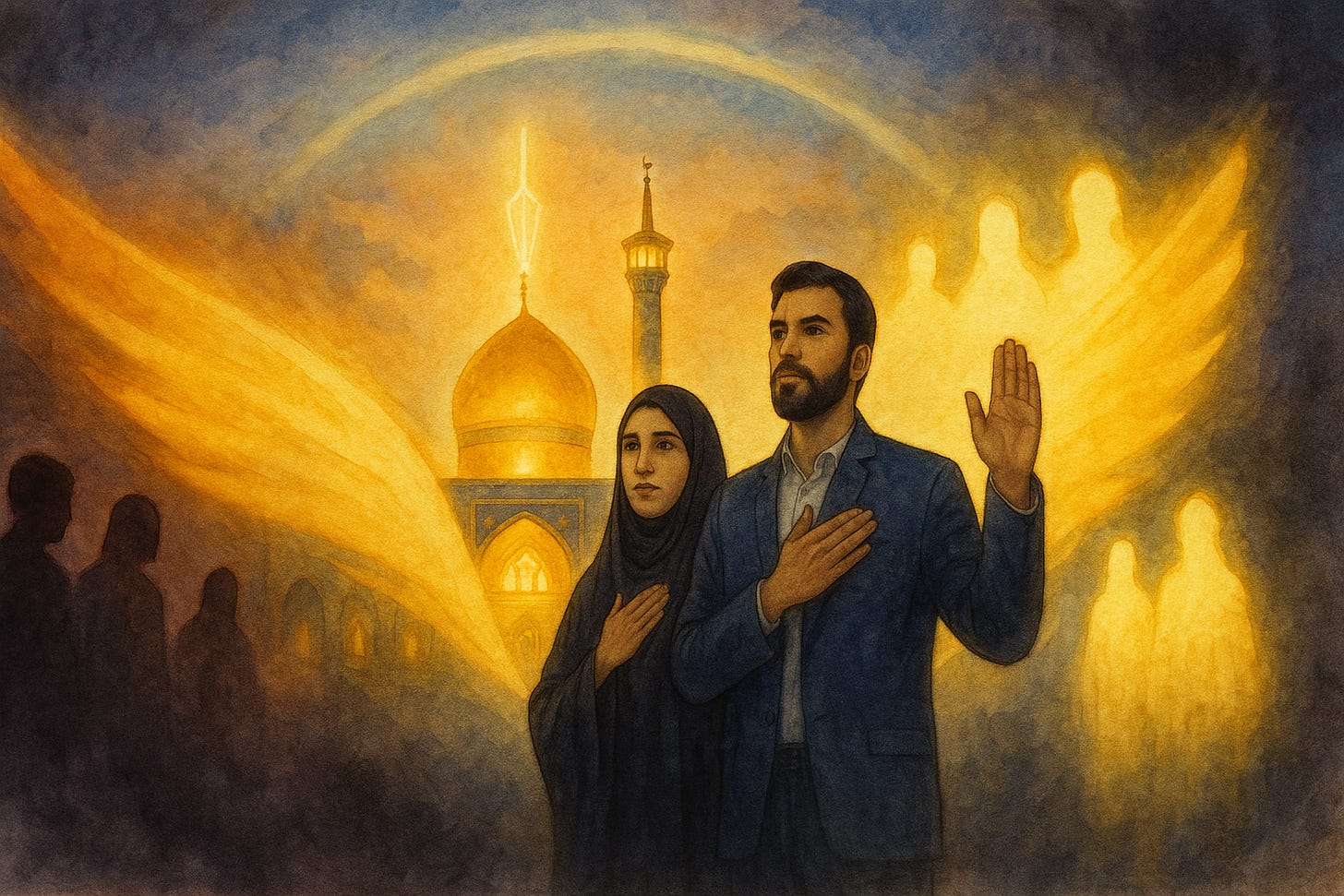
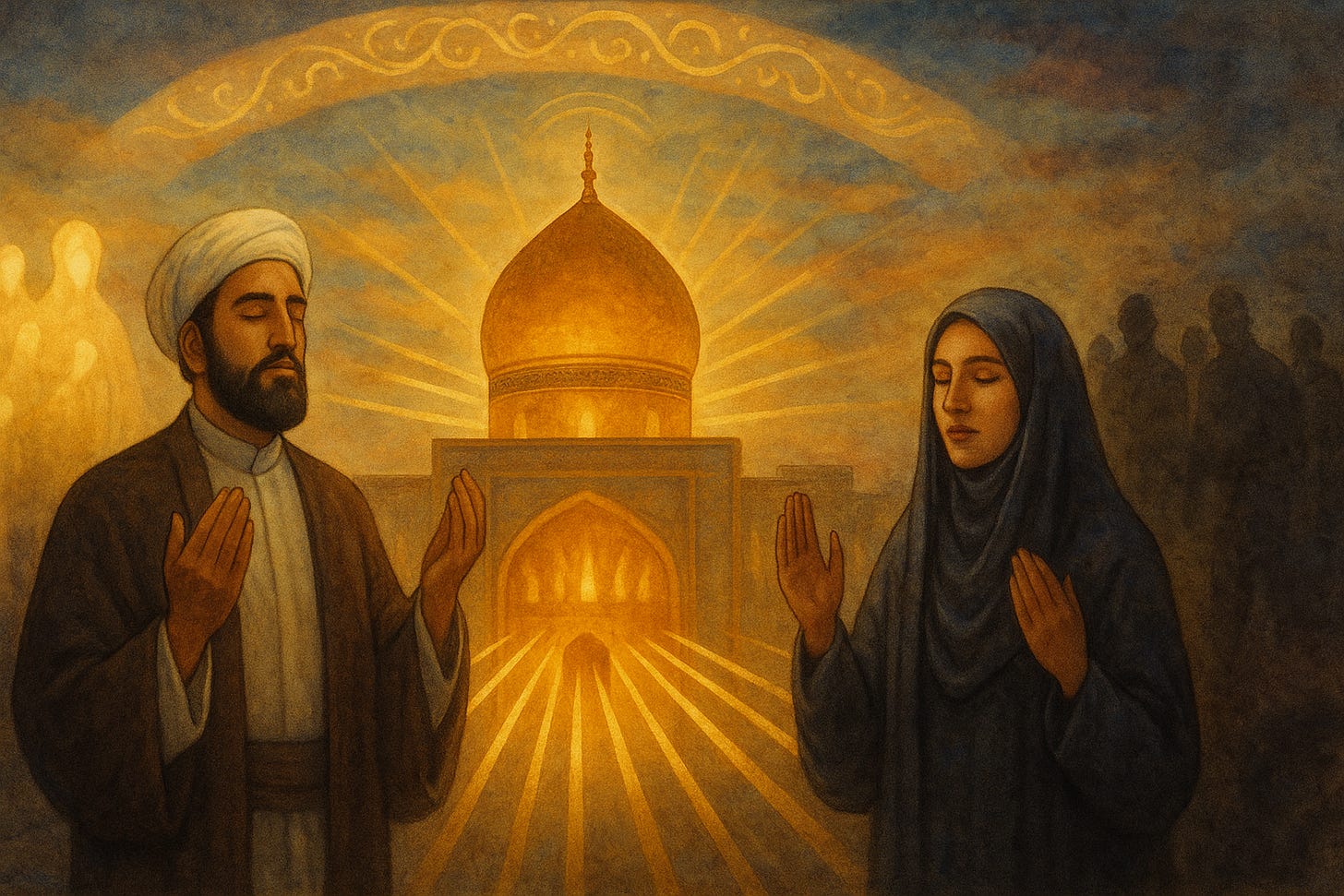
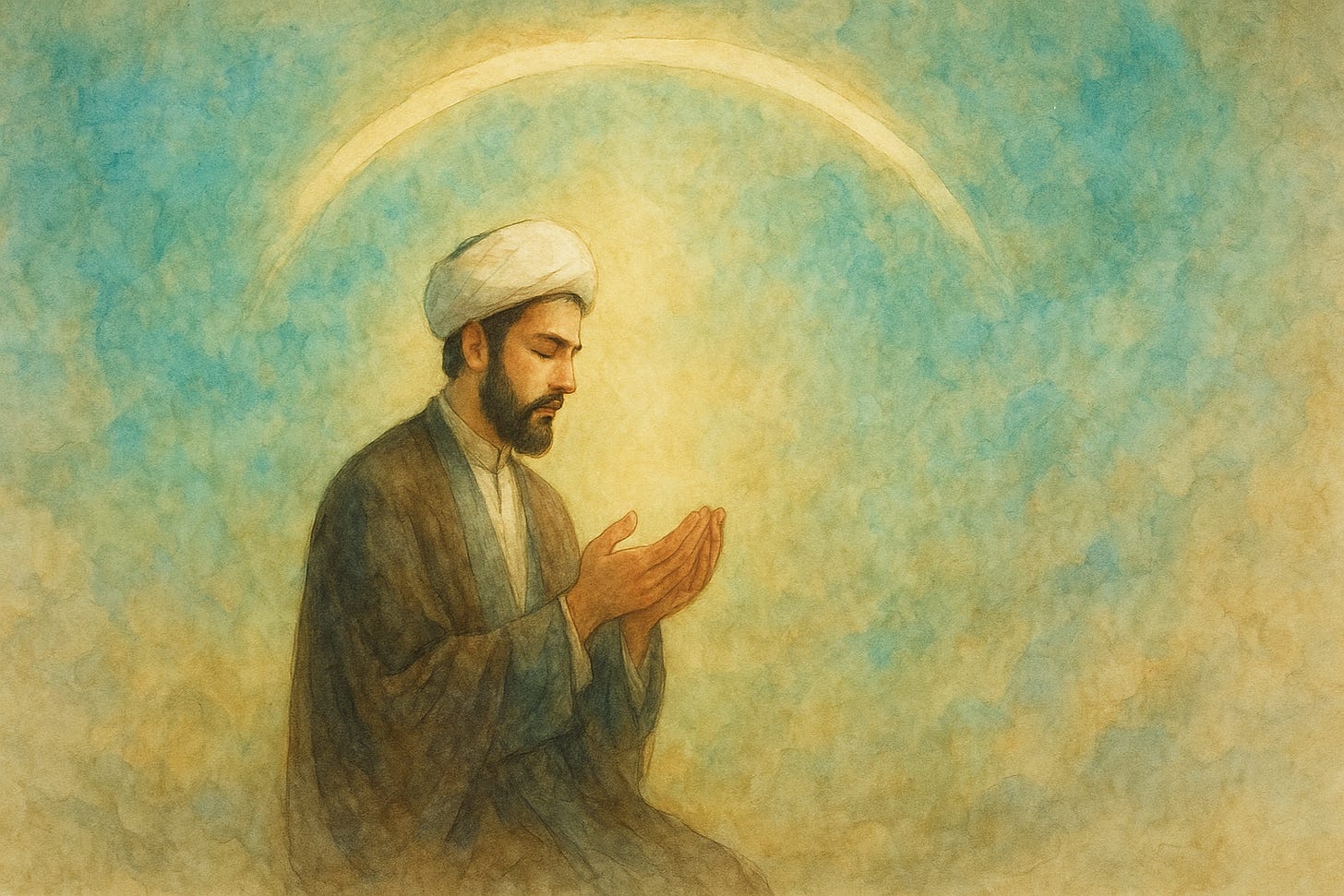
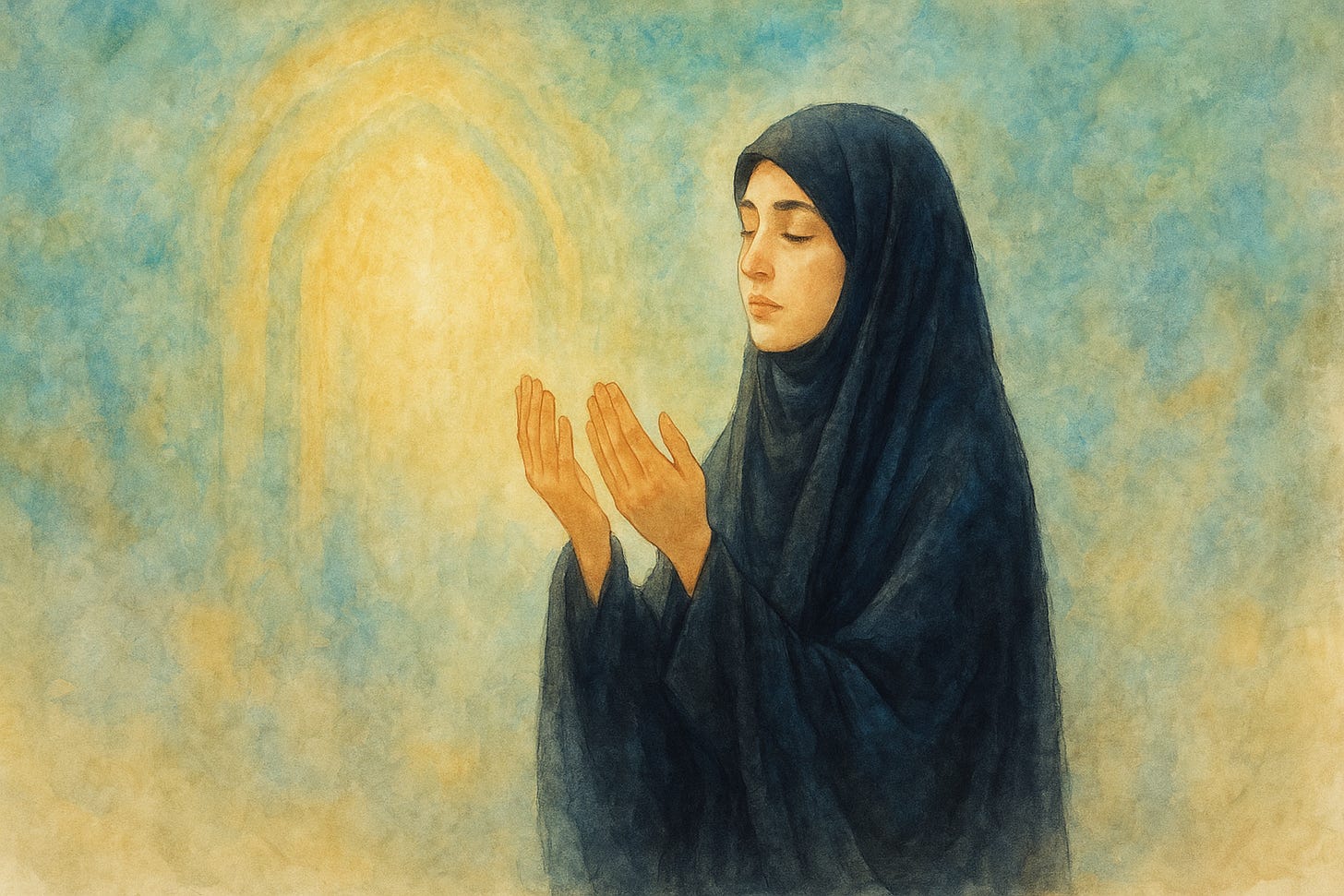

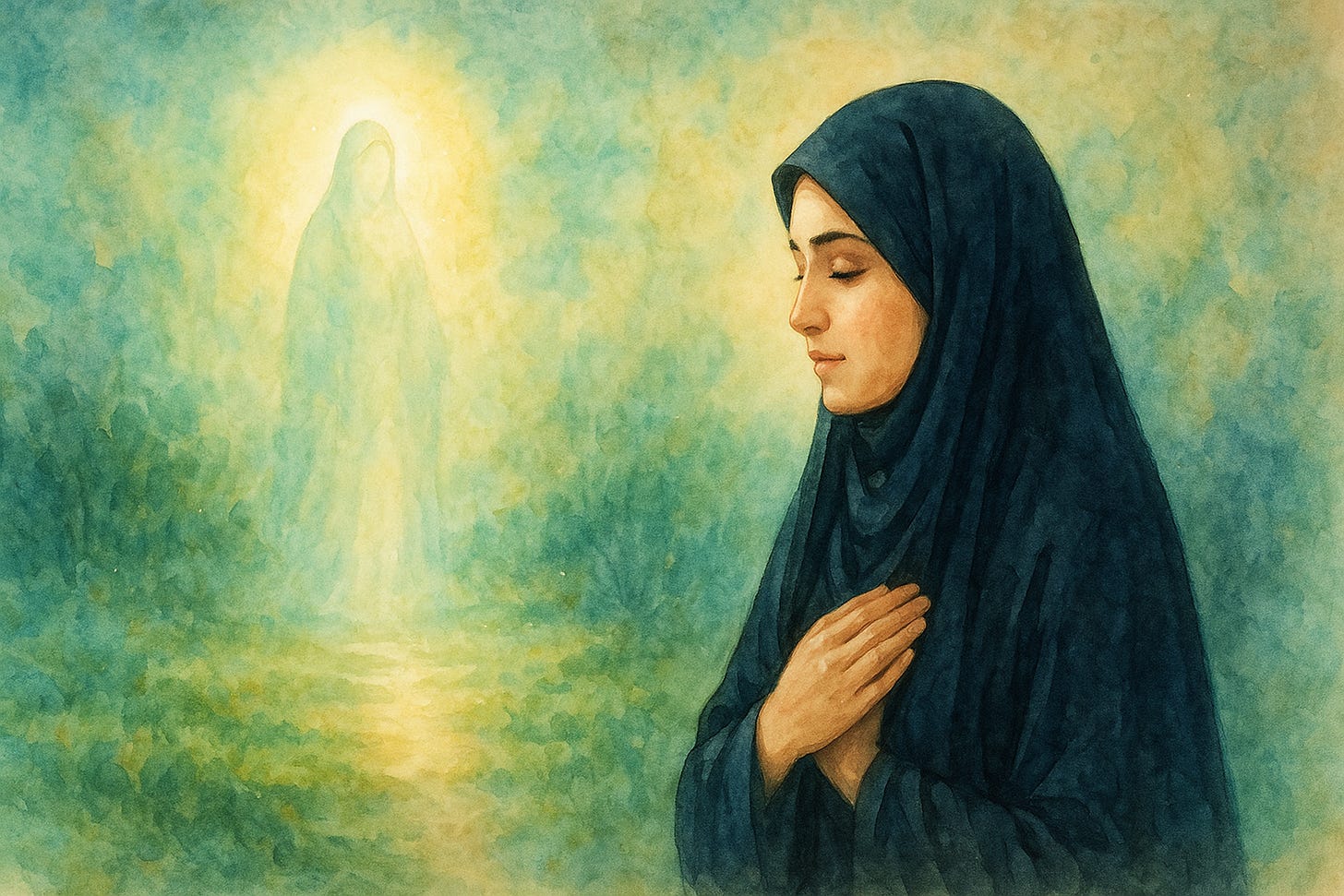
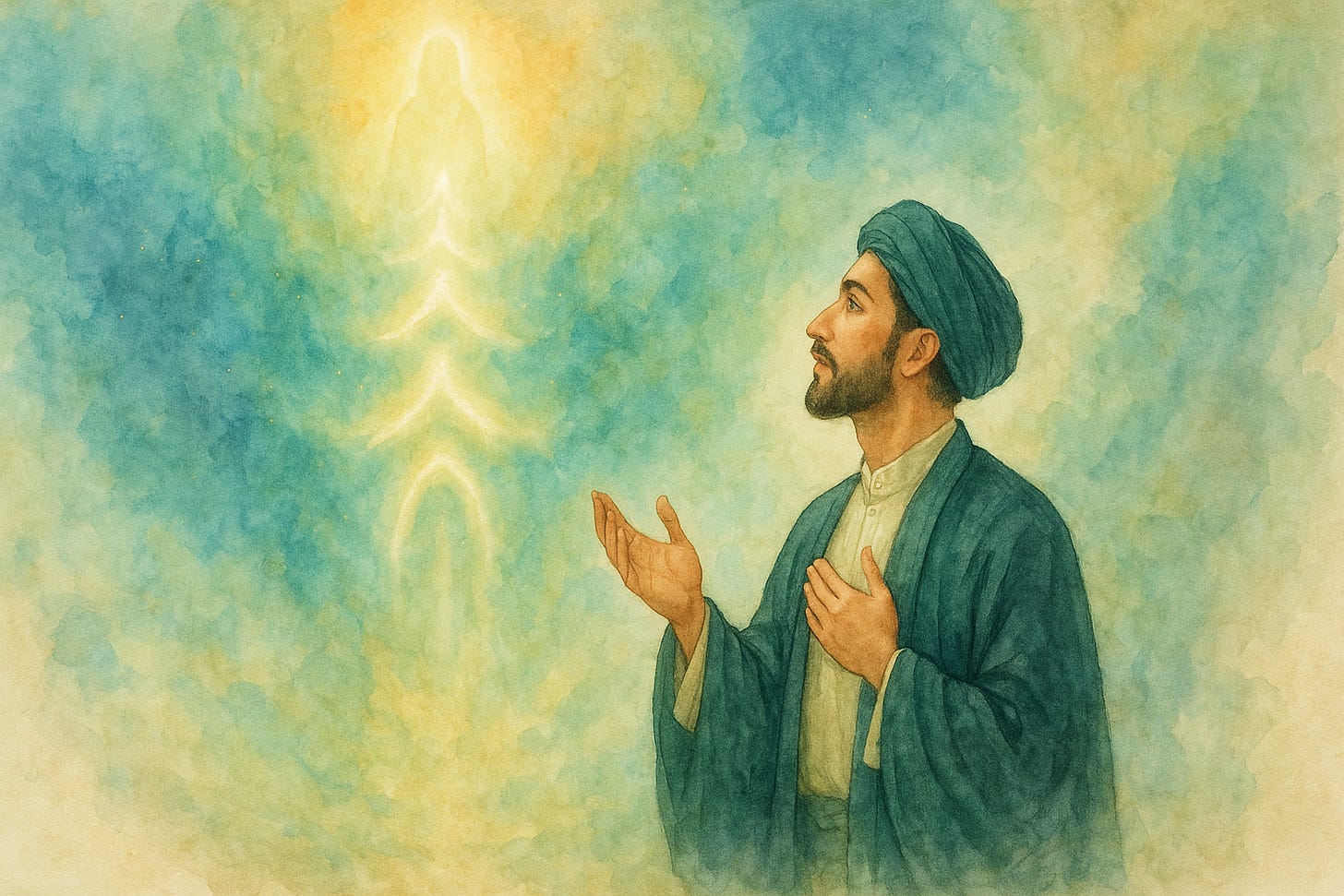
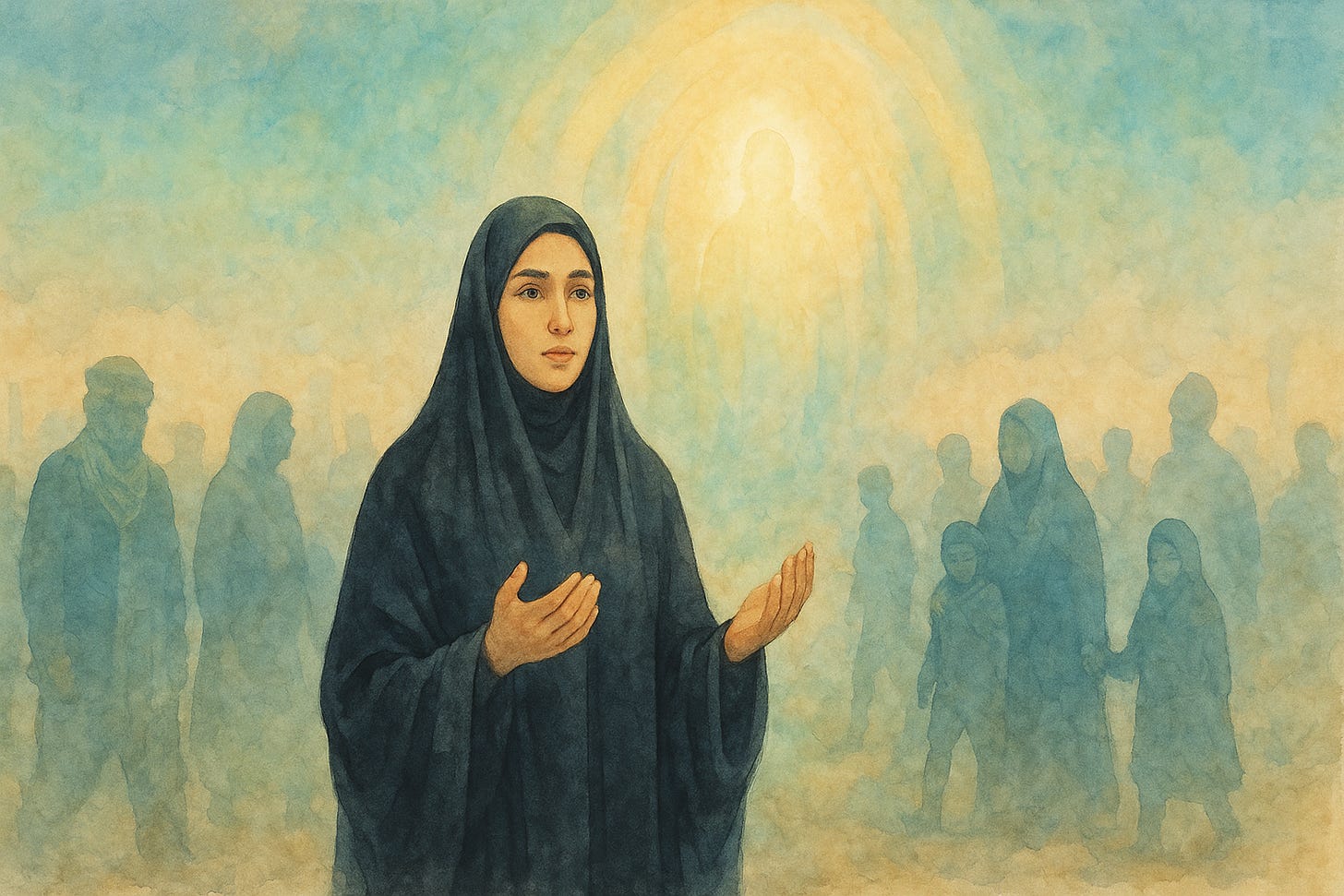

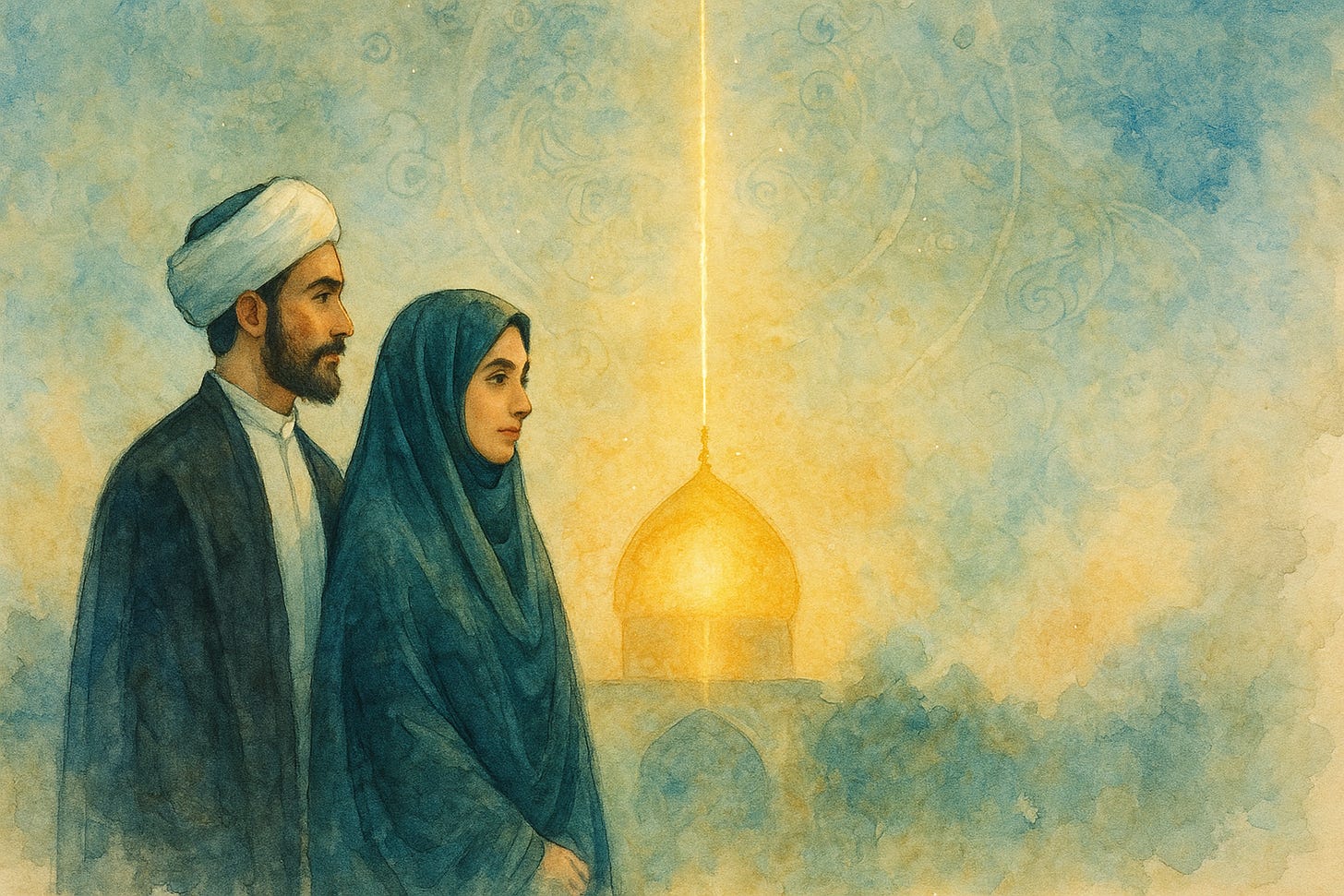

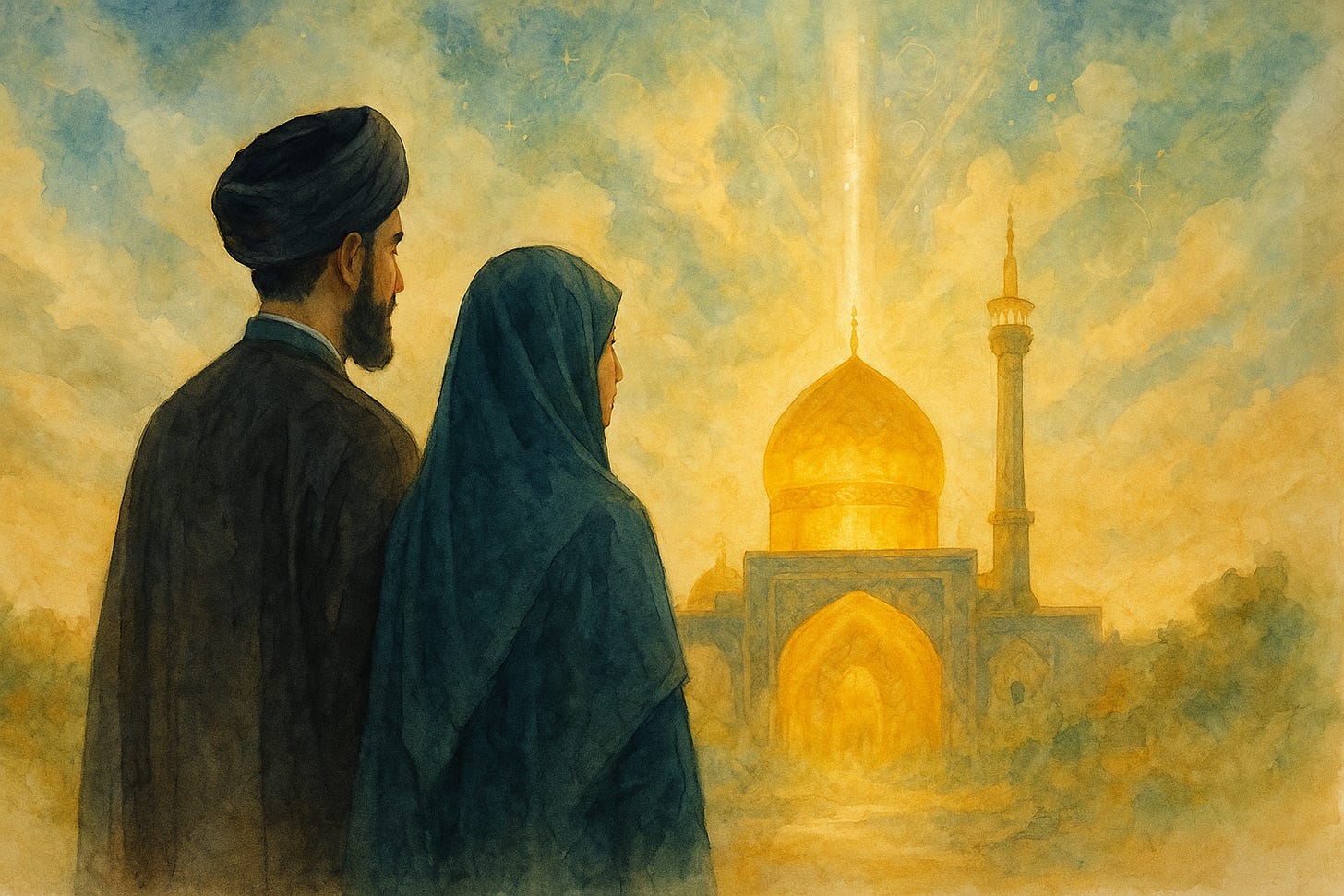
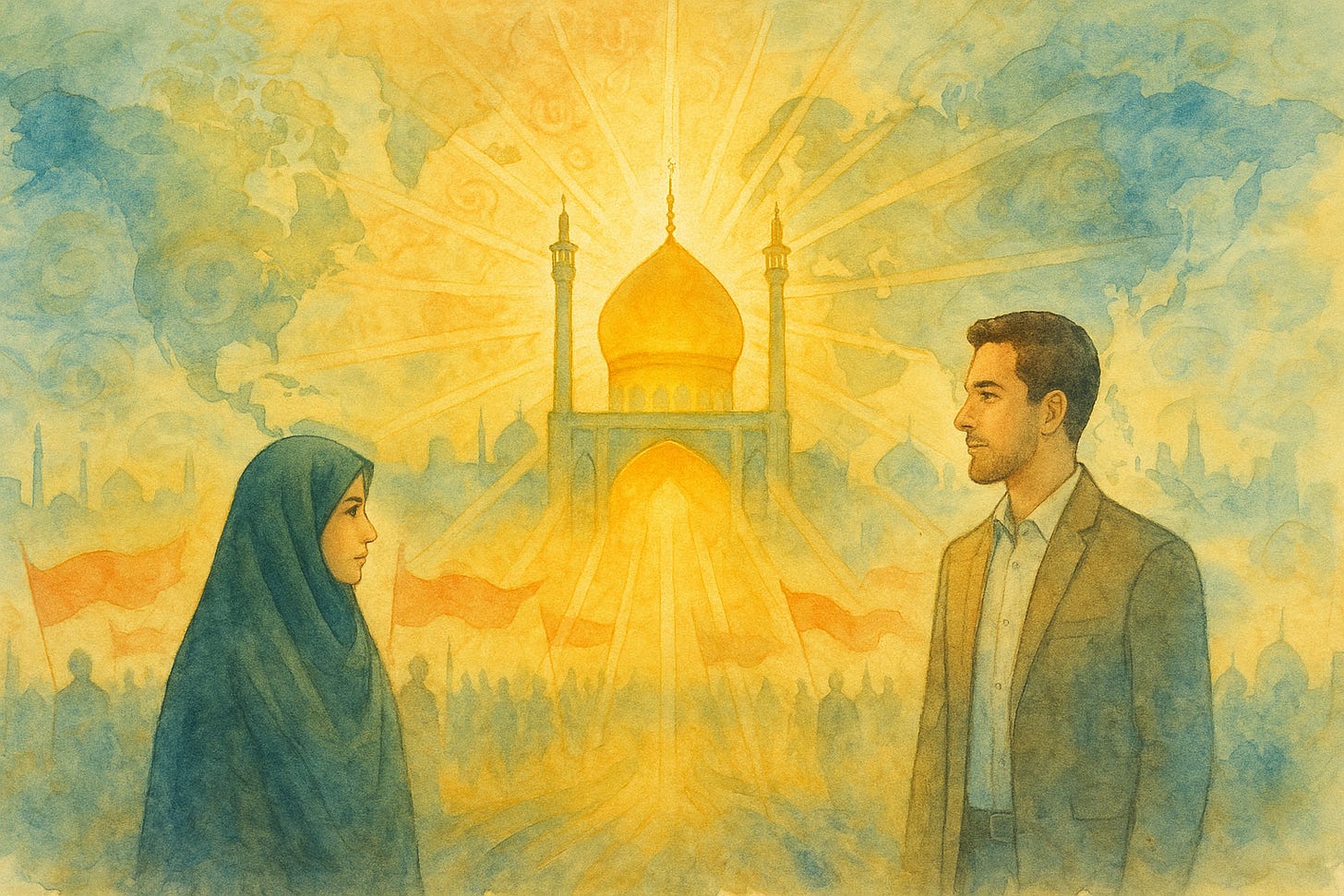
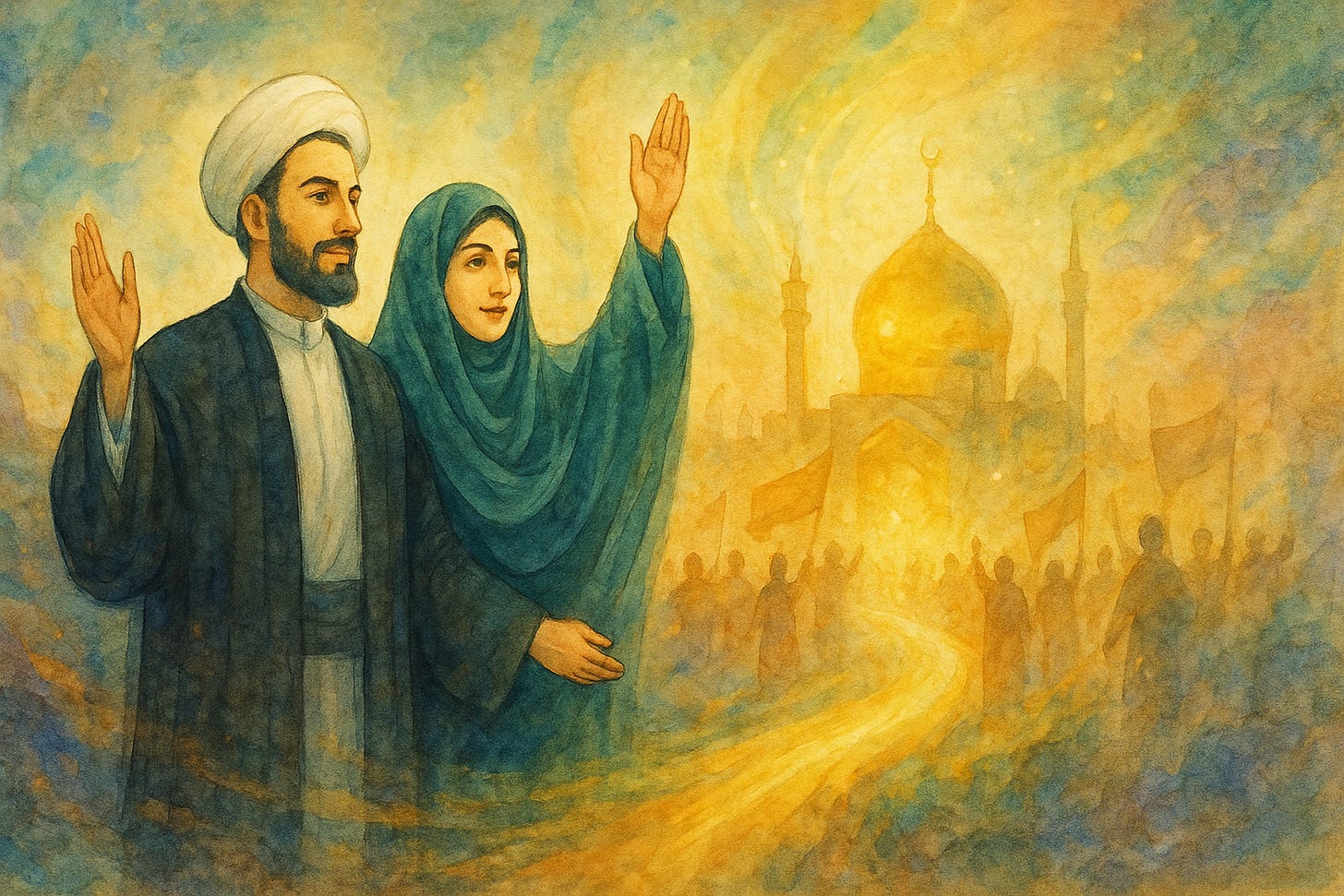
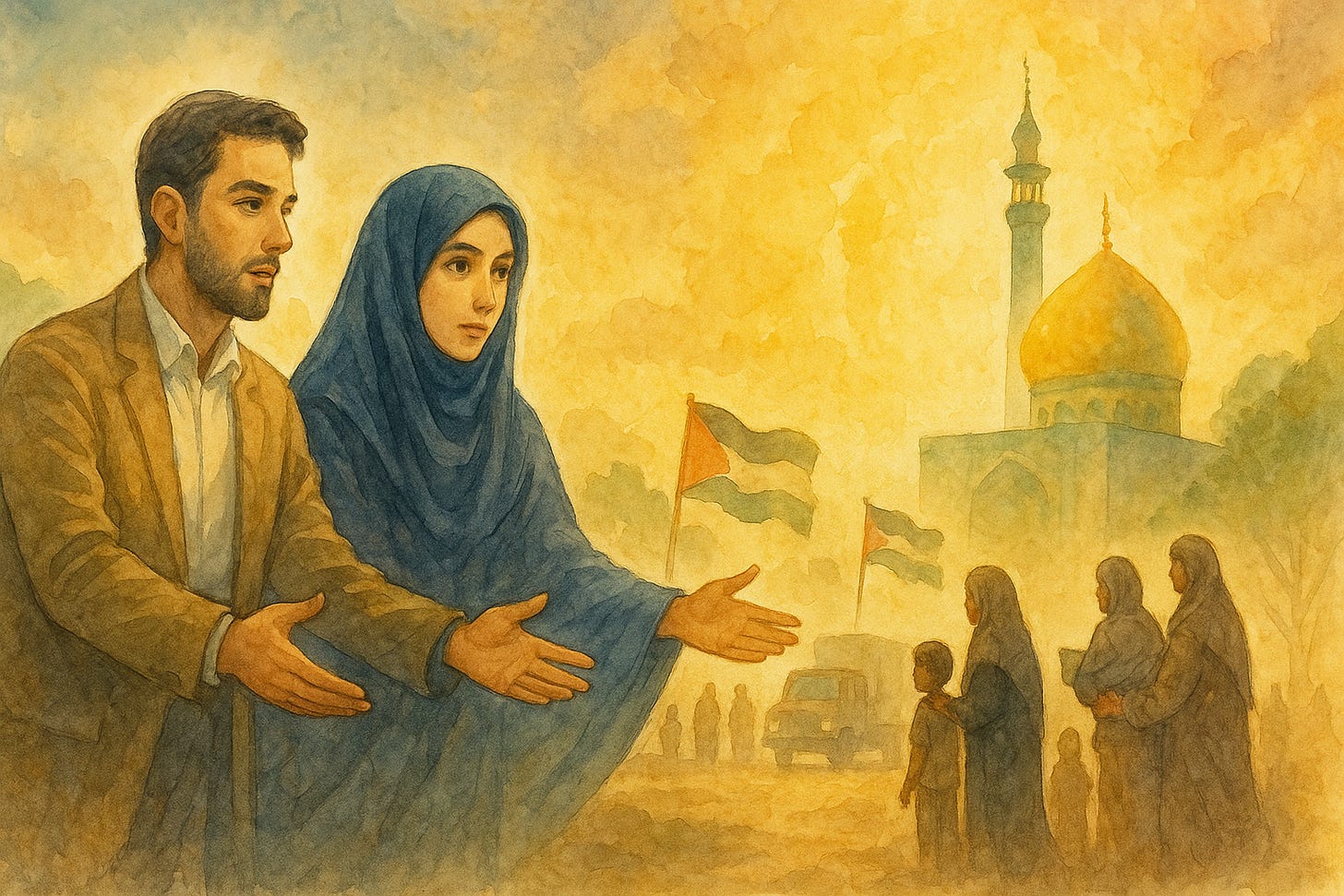

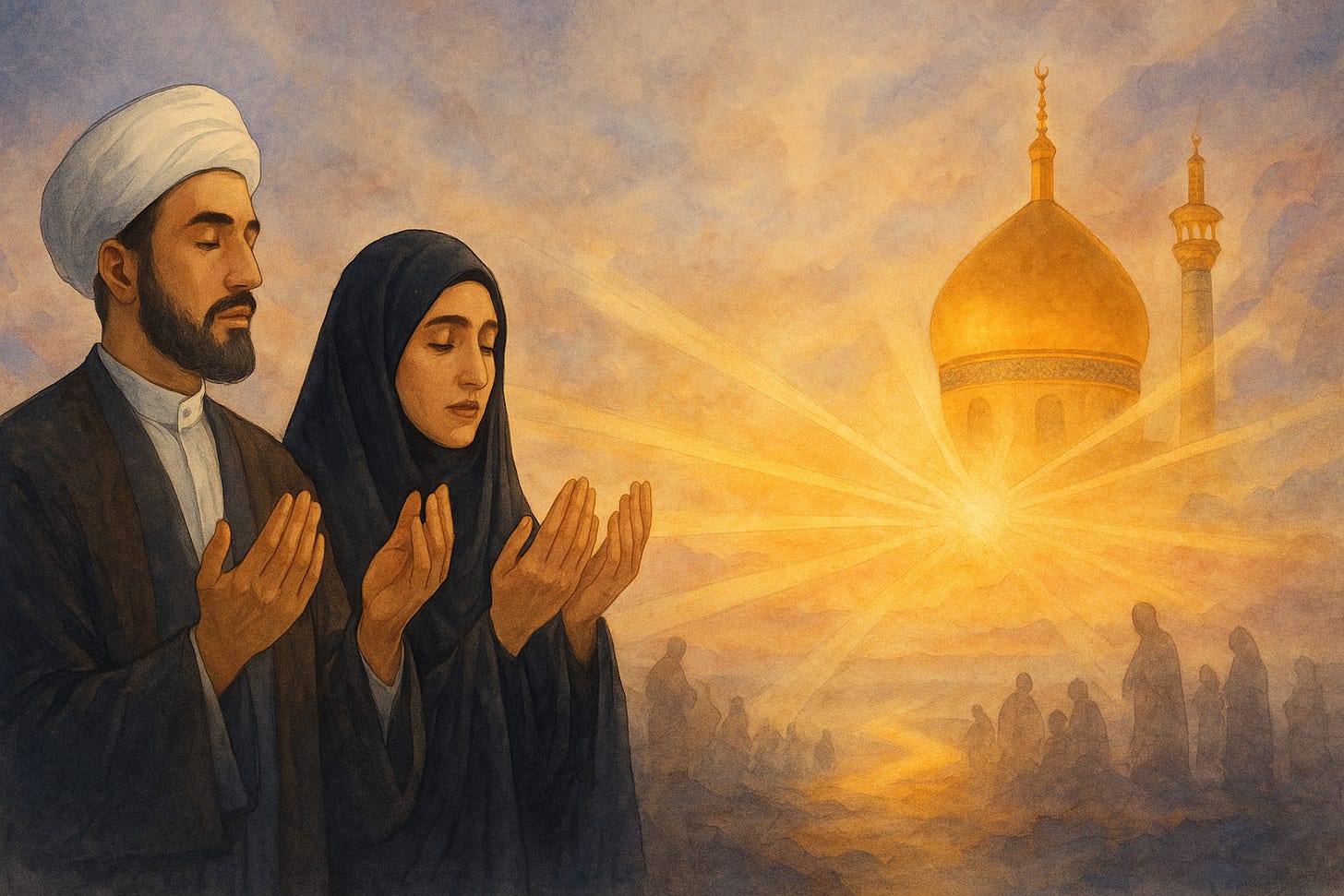
Thank you for this! I really appreciate all the sources you cite.